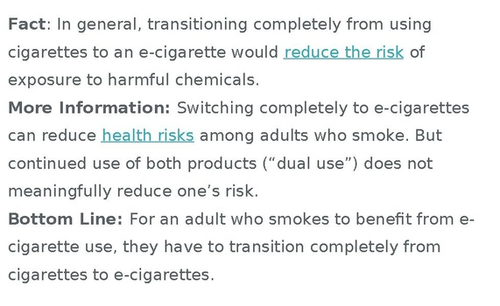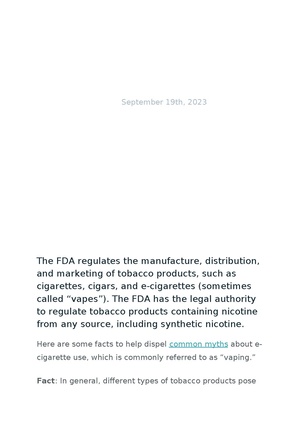Nicotine / THR - Statements from Organizations
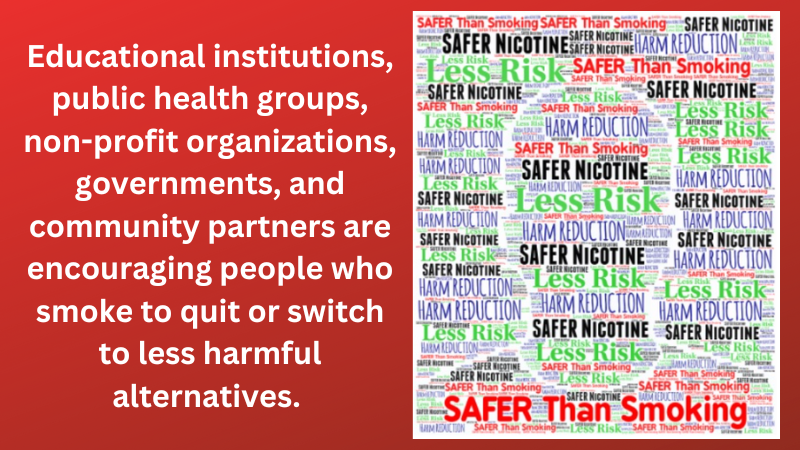
"Tobacco Harm Reduction = SAFER than smoking"
The items list below may also be found on this Google Doc
Multinational / International
World Health Organization EURO Office
International Agency for Research on Cancer
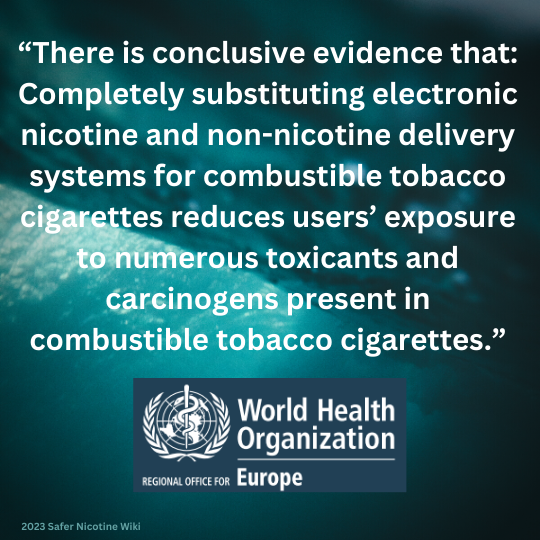
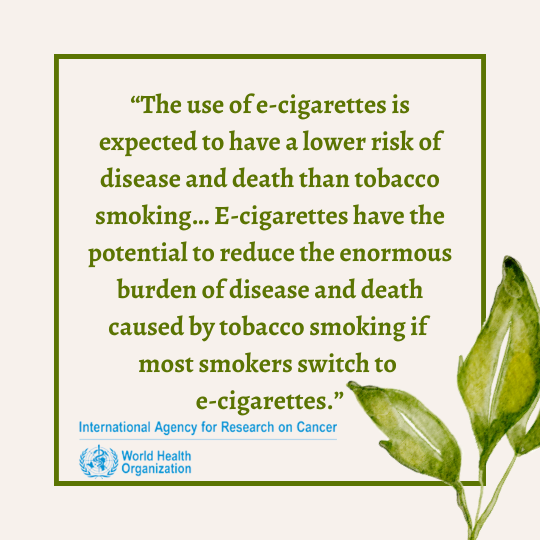
European Parliament
SCENIHR - European Commission Directorate-General, Health & Consumer Protection
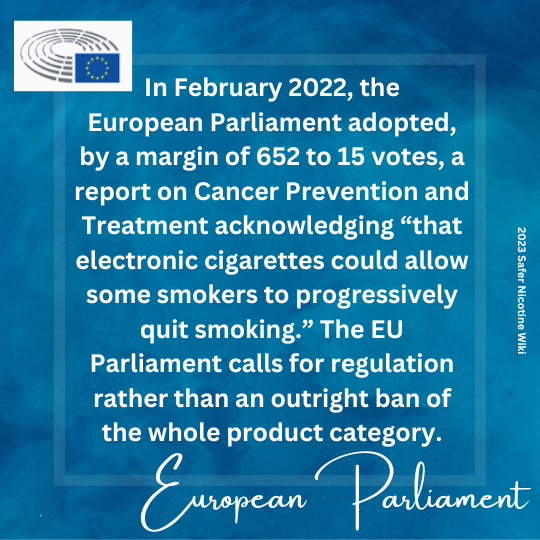
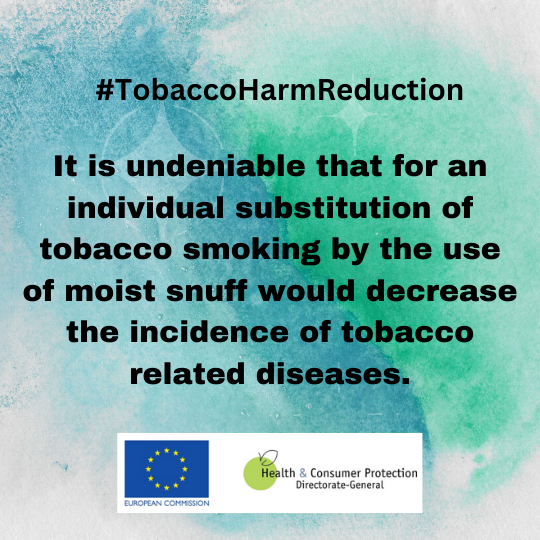
Cochrane systematic evidence review
- Source / 78 scientific studies (including >34 randomized control trials) involving 22,052 participants in a dozen countries.
15 past presidents of the Society for Research on Nicotine and Tobacco (SRNT)
- Source NOTE: This is not a statement by the SRNT.
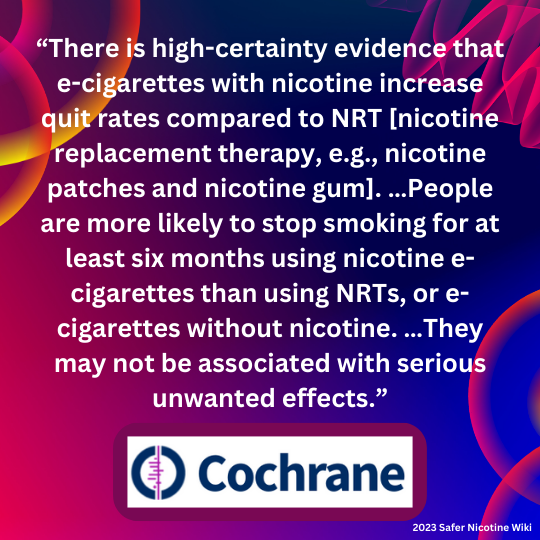
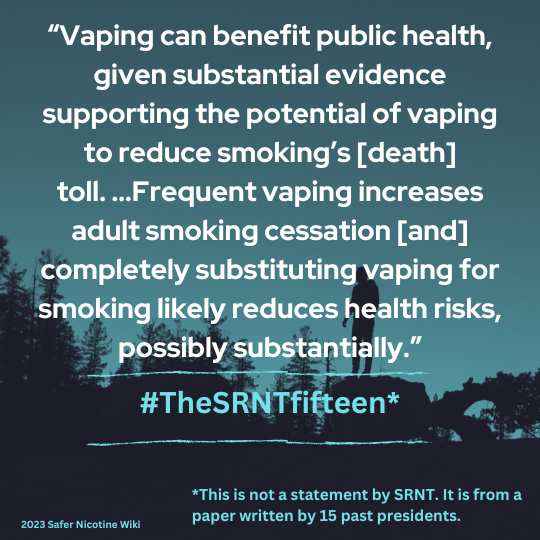
World Heart Federation
The Tobacco Atlas
- Source / Vital Strategies was formed out of a merger between World Lung Foundation and The Union.
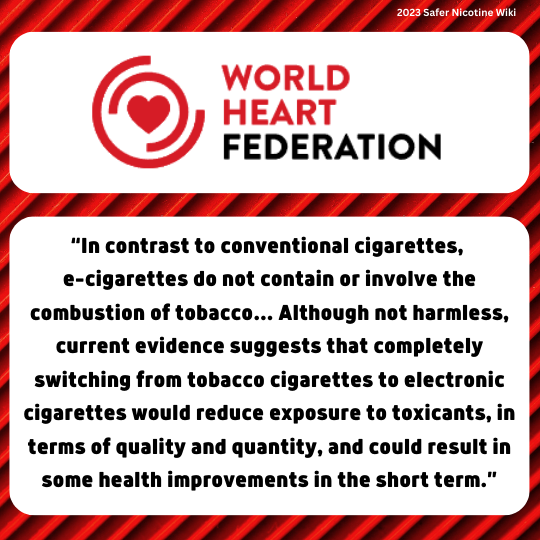
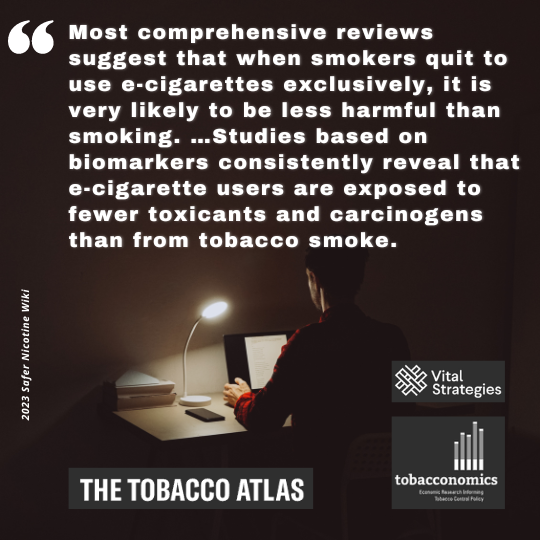
Bill and Melinda Gates Foundation
European Respiratory Society
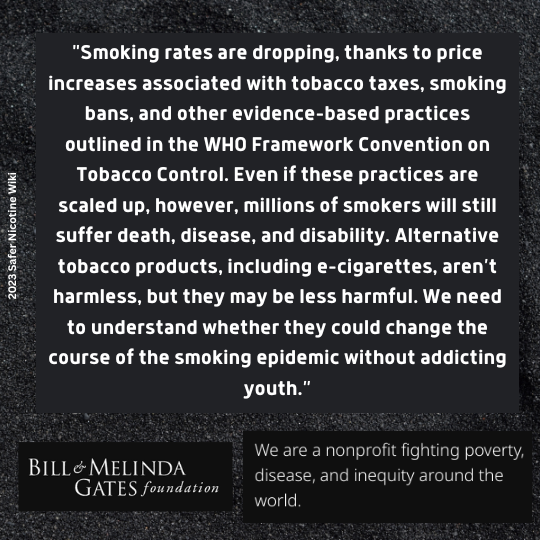
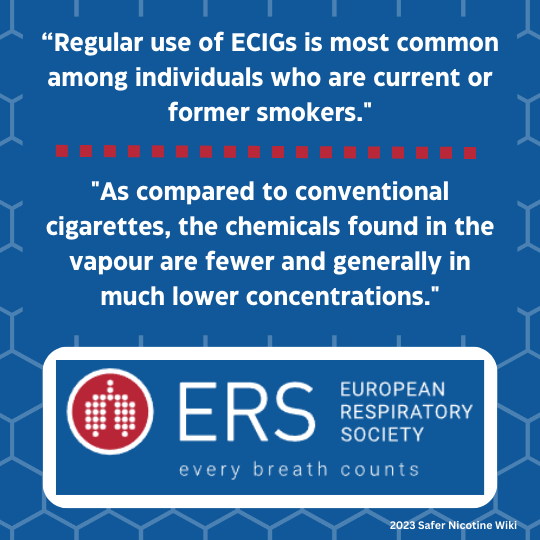
Center For Black Equity
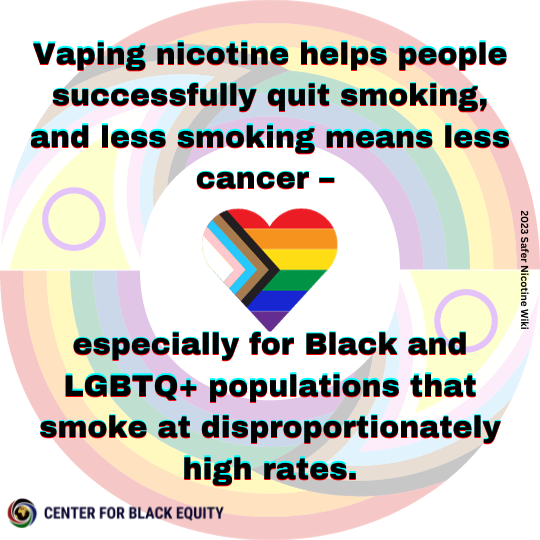
Region: England, Ireland, Scotland, and Wales
UK Department of Health, Towards a Smokefree Generation - A Tobacco Control Plan for England
Office for Health Improvement & Disparities
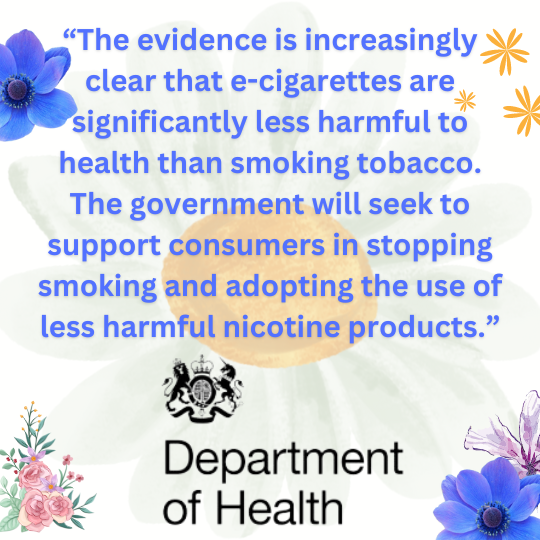
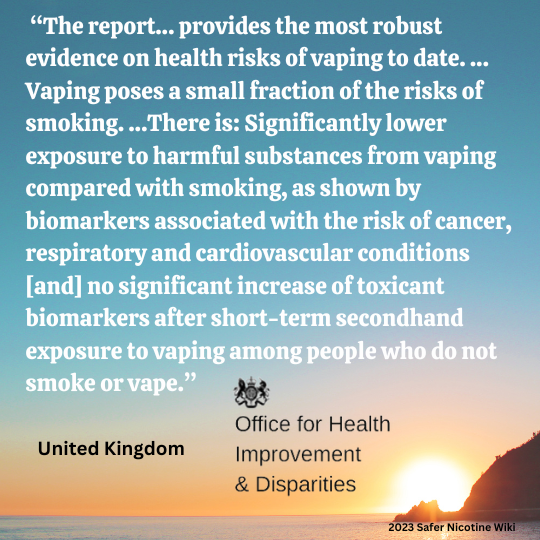
Public Health England
Royal College of Physicians
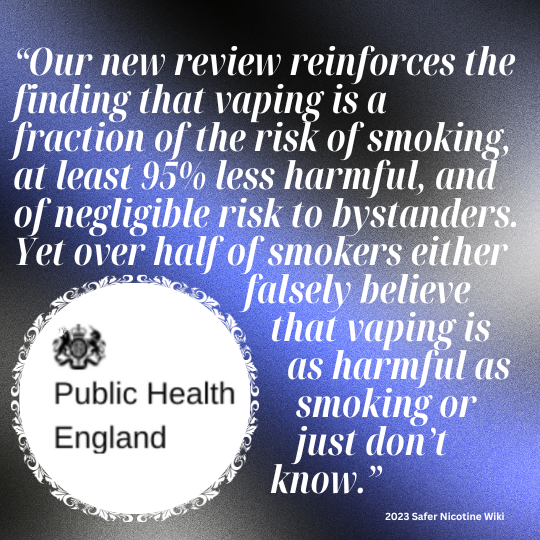
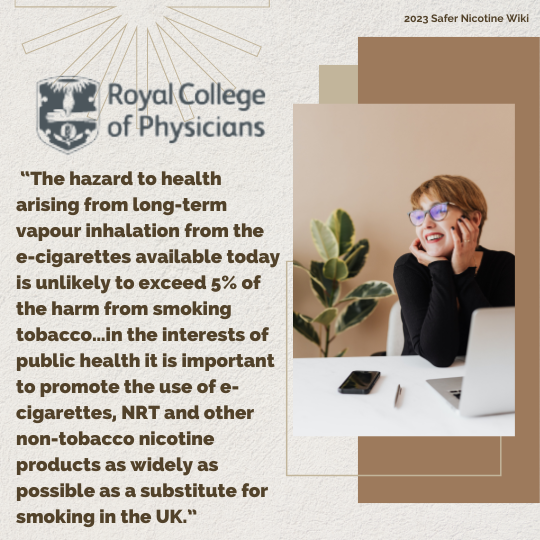
British Medical Association
Cancer Research UK
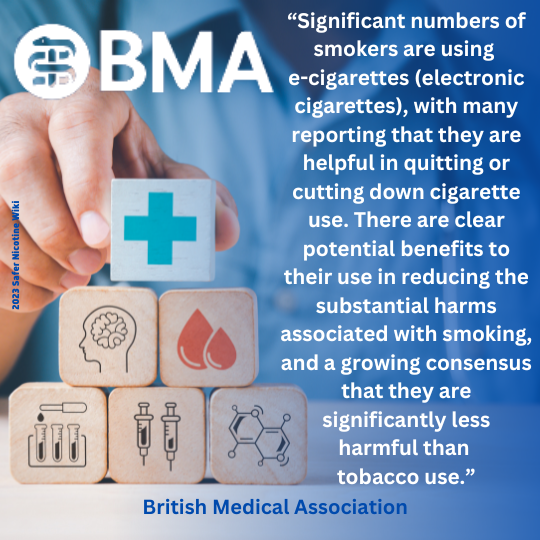
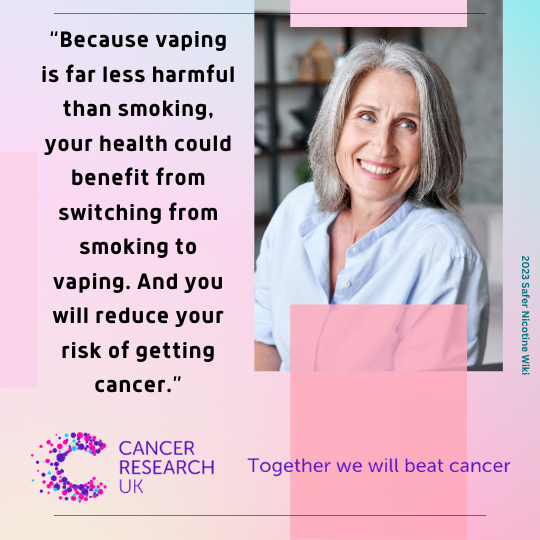
British Lung Foundation
Asthma + Lung UK
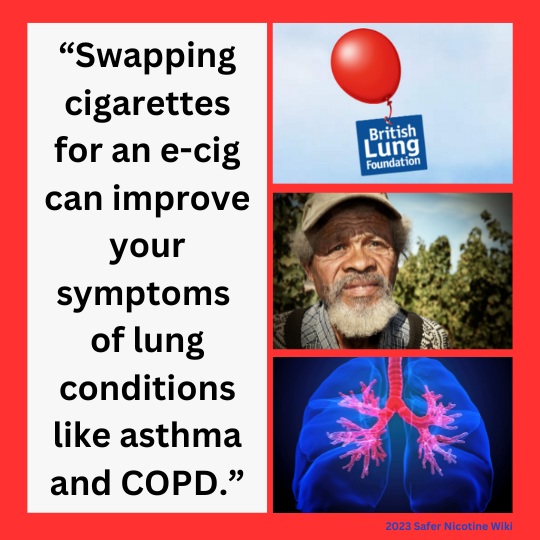
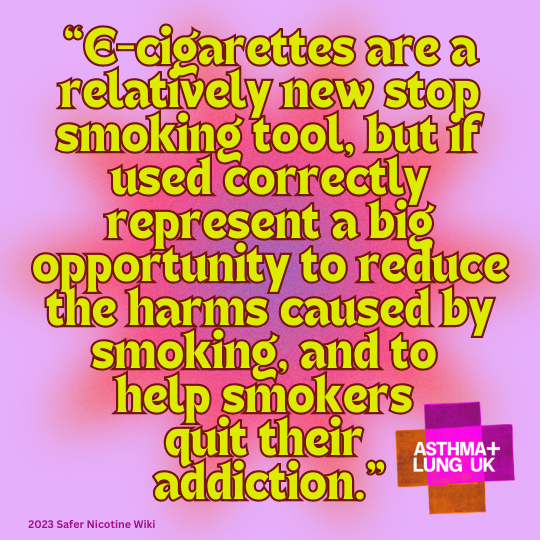
Primary Care Respiratory Society
Roy Castle Lung Cancer Foundation
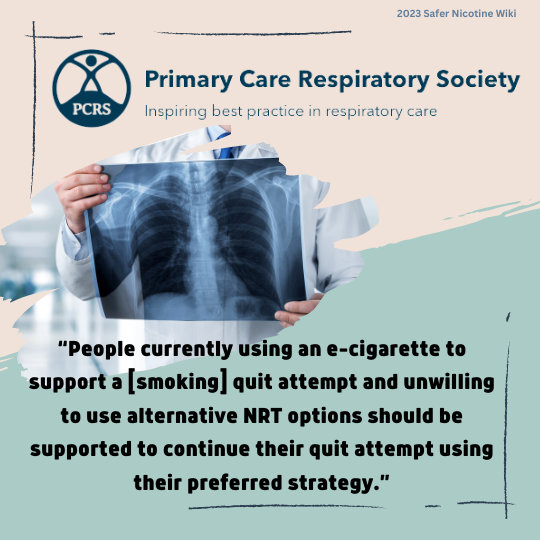
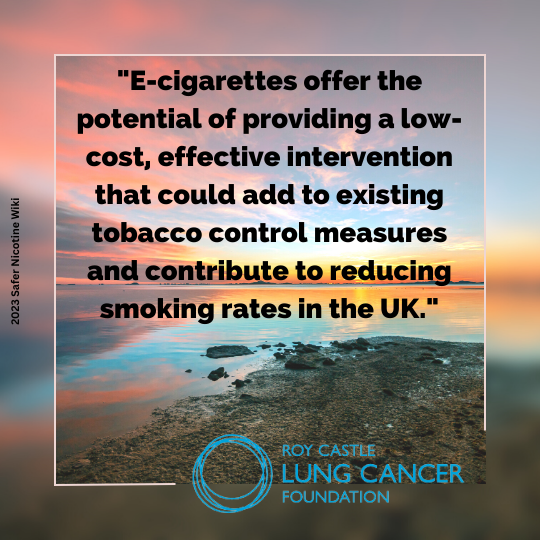
British Thoracic Society
British Heart Foundation
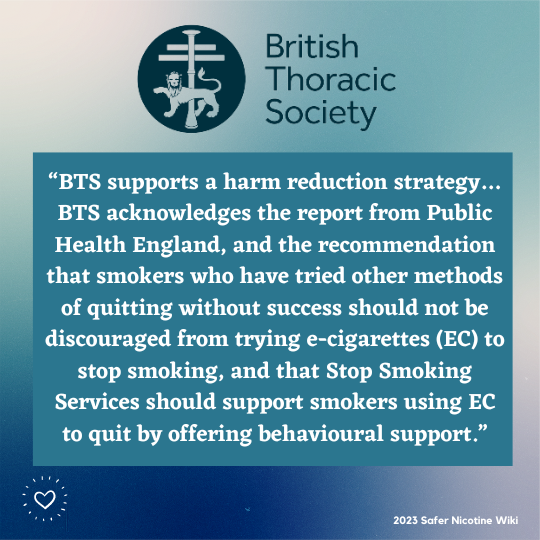
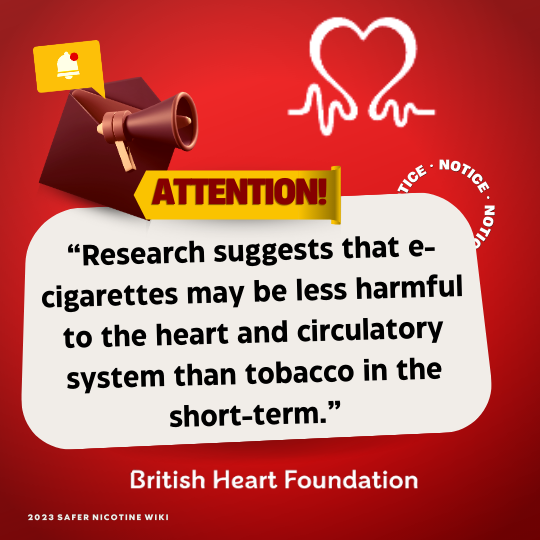
The British Psychological Society
UK National Institute for Health and Care Excellence (NICE)
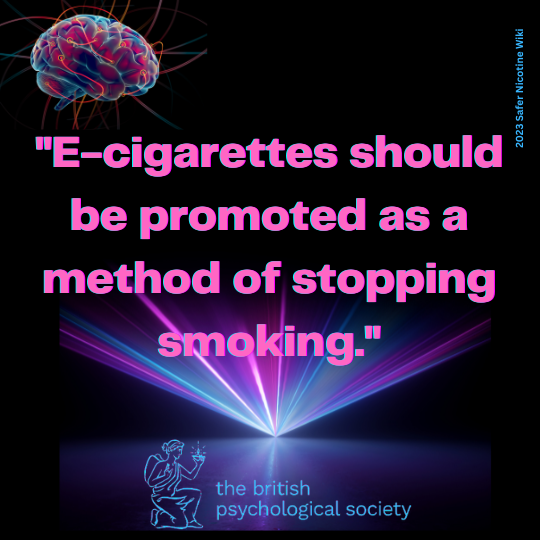
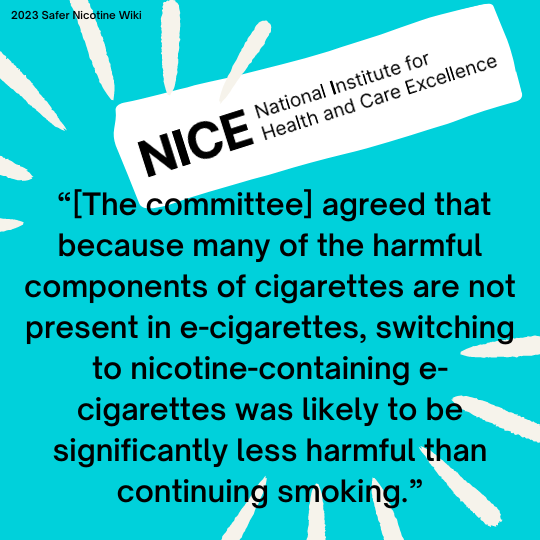
Royal College of General Practitioners
Royal Society for Public Health
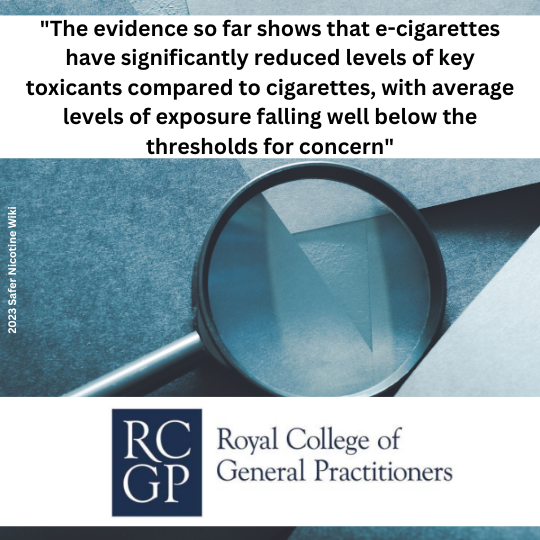
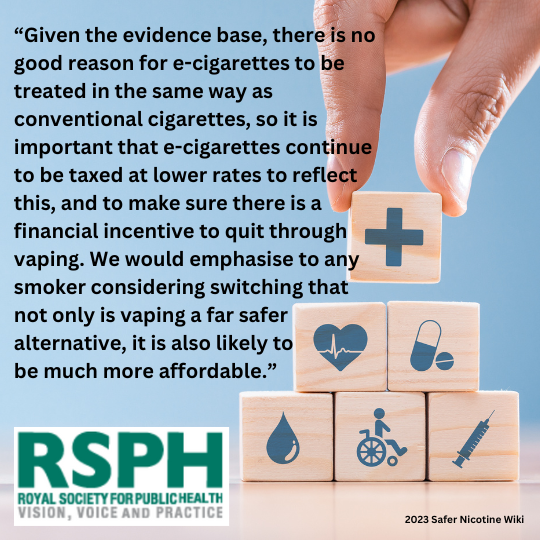
UK Parliament - Science, Innovation and Technology Committee
Stroke Association
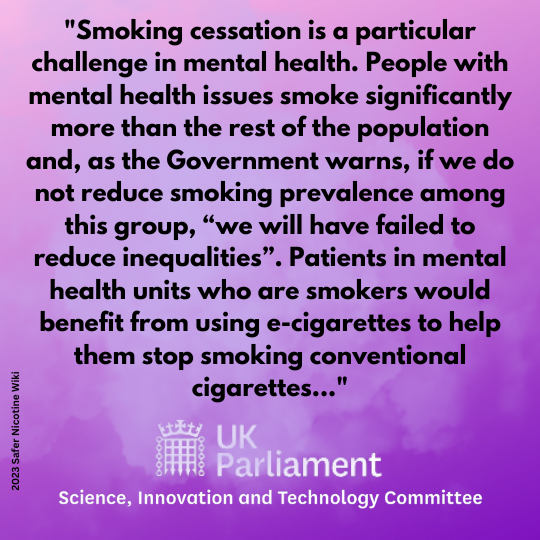
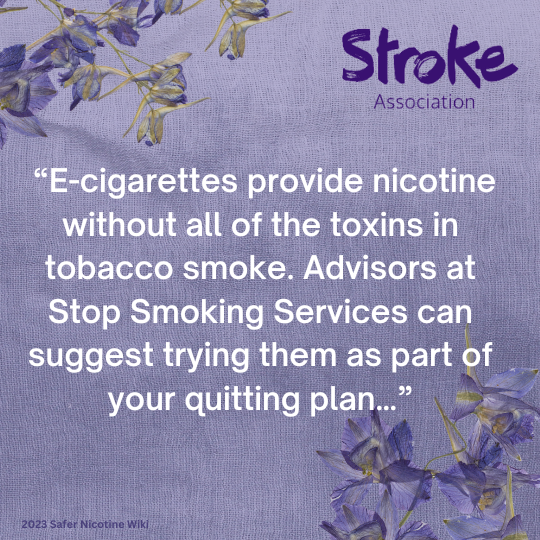
Royal College of Occupational Therapists
Action on Smoking and Health UK (ASH)
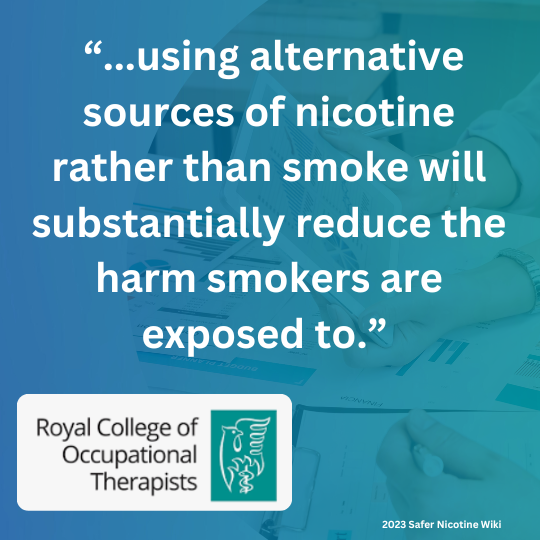
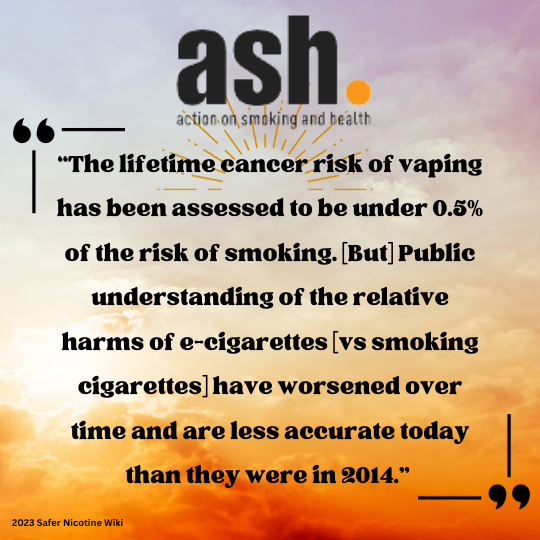
National Centre for Smoking Cessation and Training (NCSCT)
Royal college of Psychiatrists
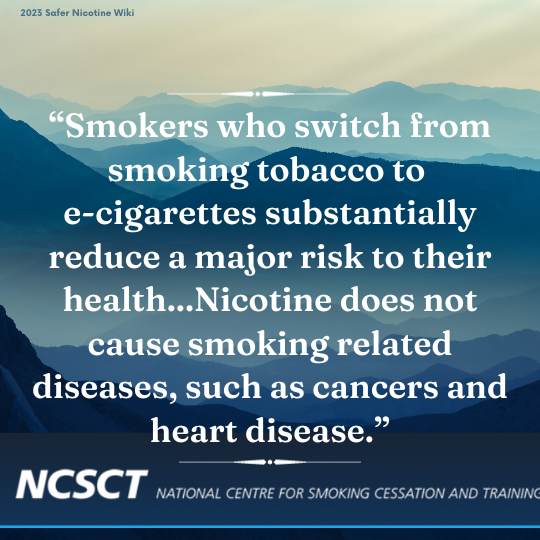
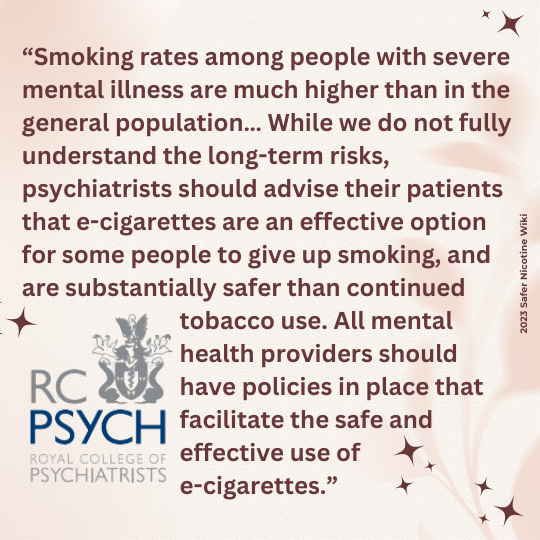
Faculty of Public Health
Royal Pharmaceutical Society
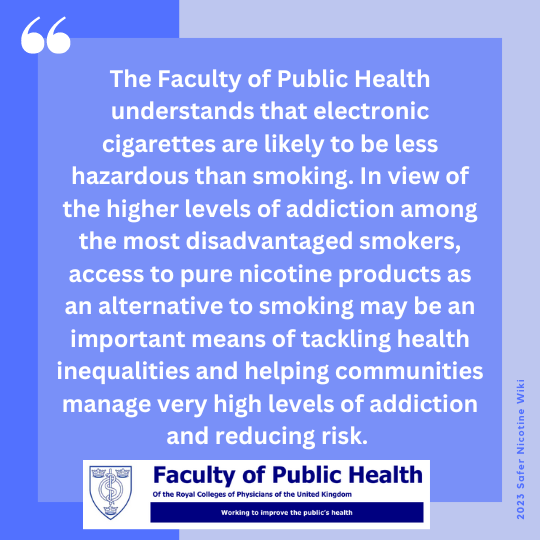
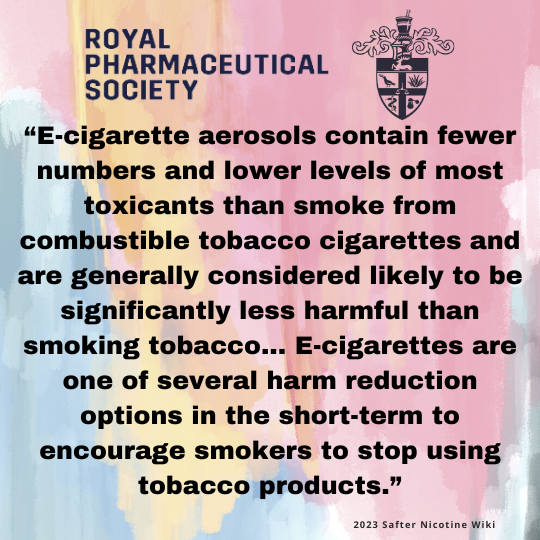
Royal College of Midwives
Chartered Institute of Environmental Health
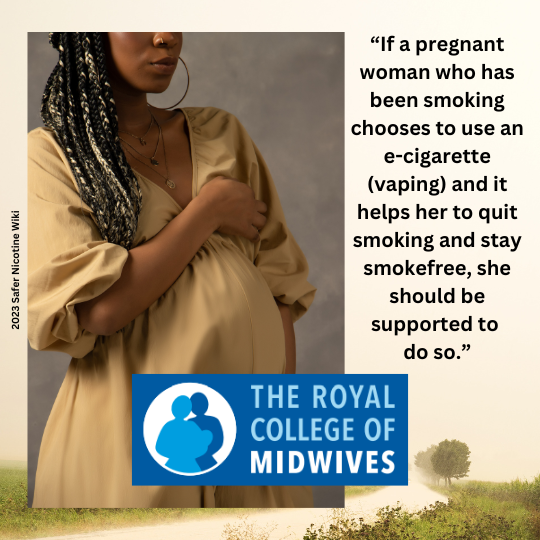
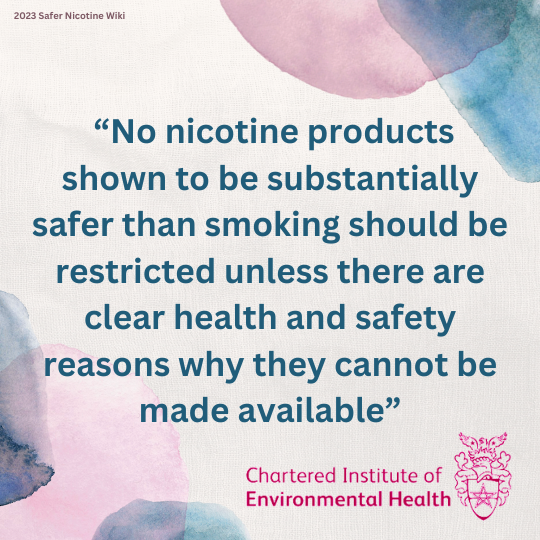
LGBT Foundation
UK Teratology Information Service
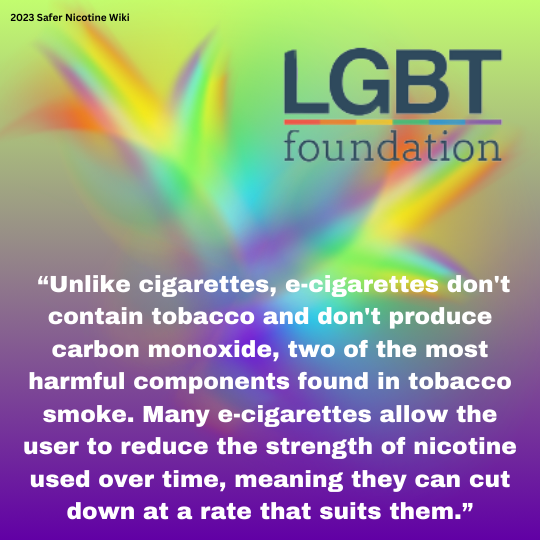
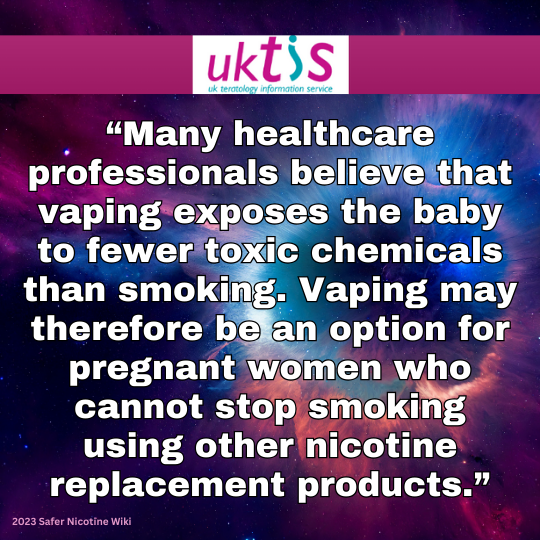
Centre for Mental Health
London Fire Brigade
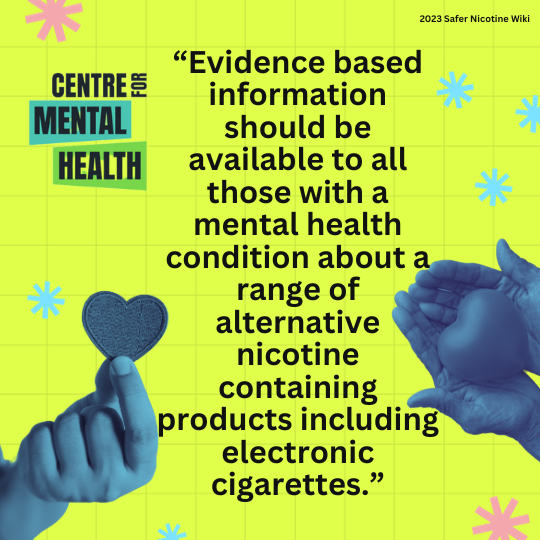
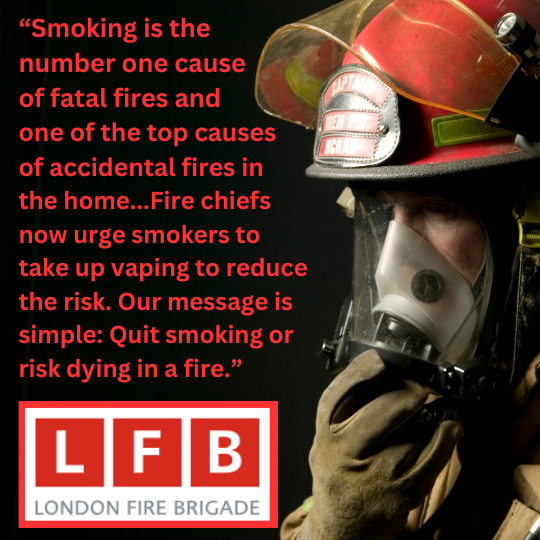
UK National Fire Chiefs Council
Association of Directors of Public Health North East
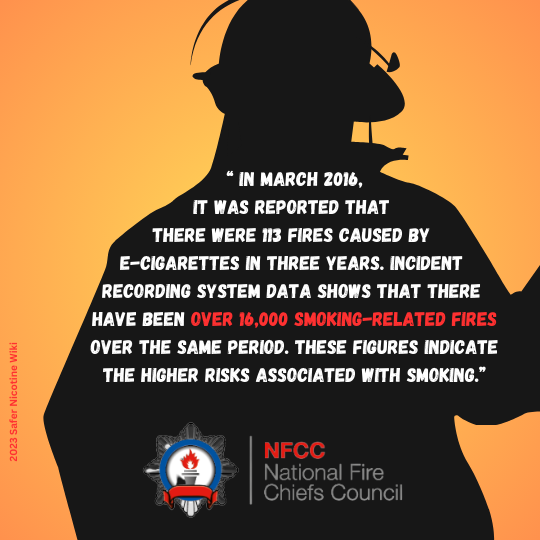
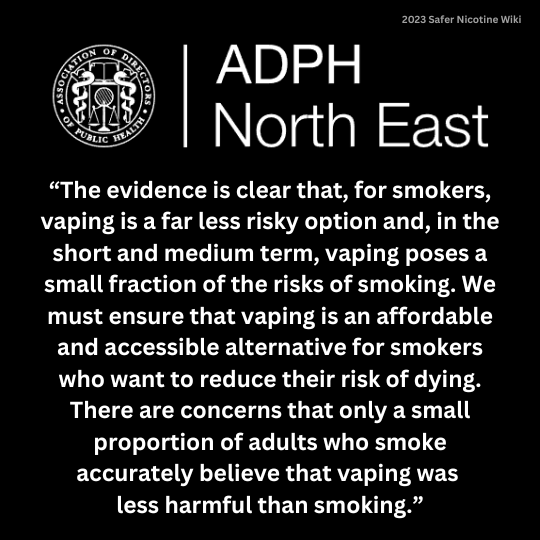
Rethink Mental Illness
UK Centre for Tobacco and Alcohol Studies
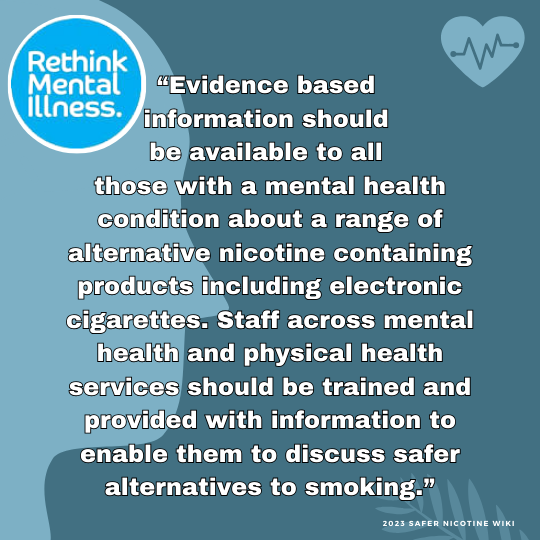
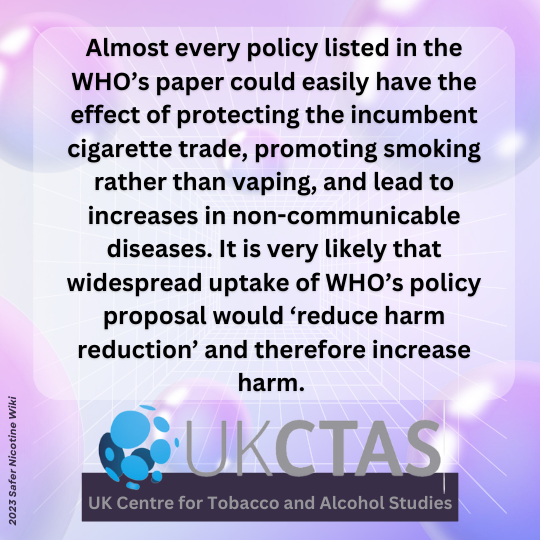
Royal College of Nursing
Heart UK
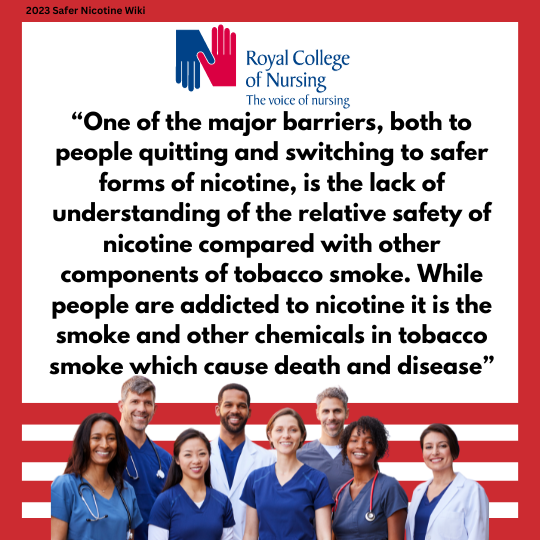
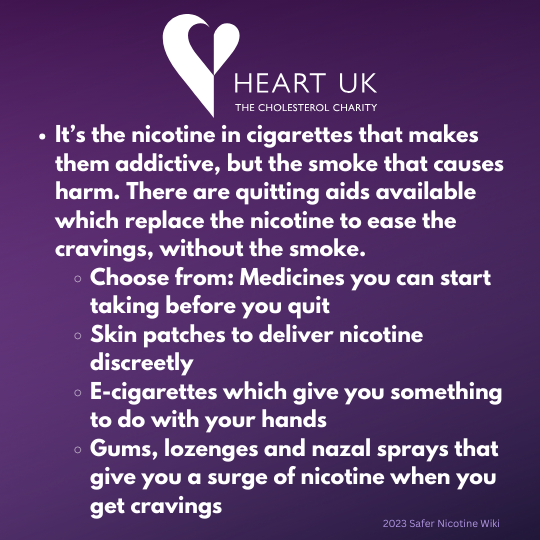
Association of Directors of Public Health
College of Mental Health Pharmacy
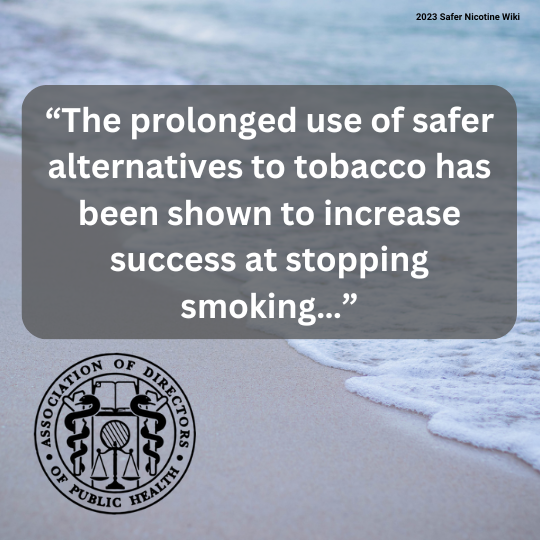
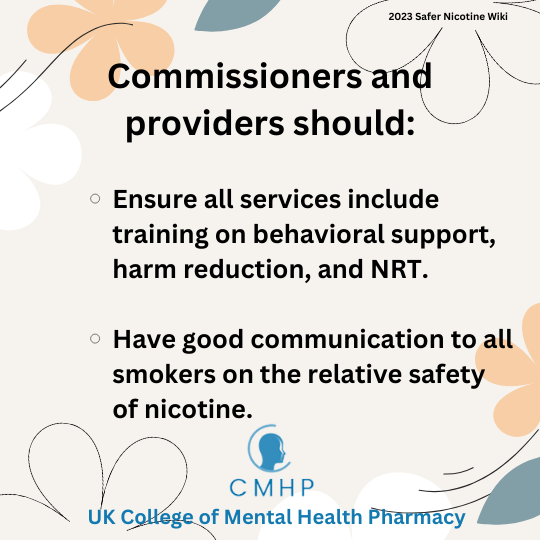
Fresh North East
Healthier Futures
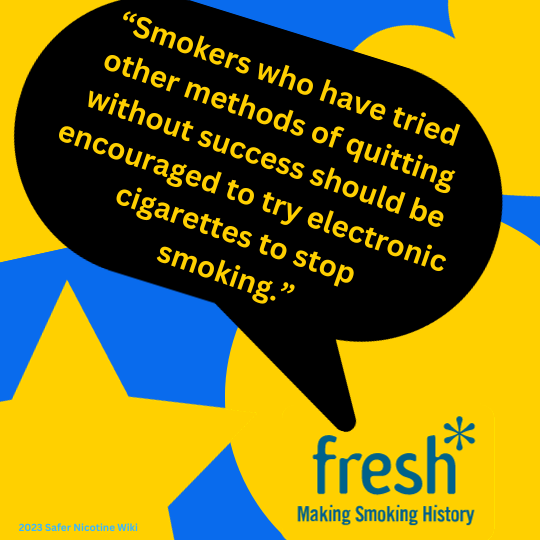
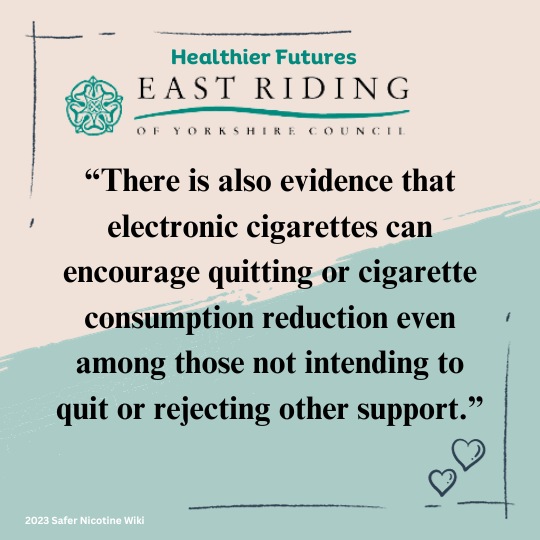
Mental Health Foundation
Mental Health Nurses Association
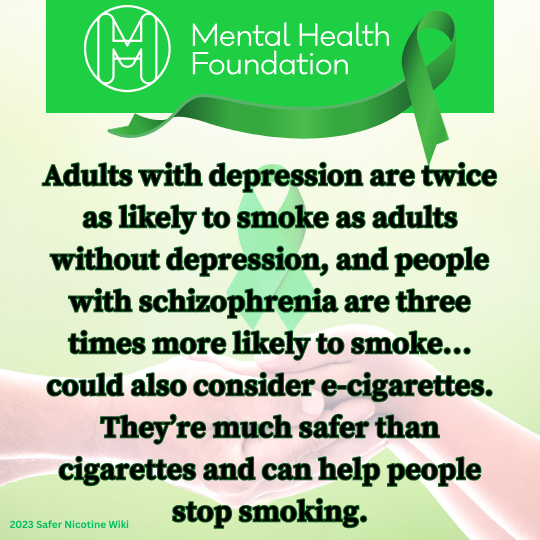
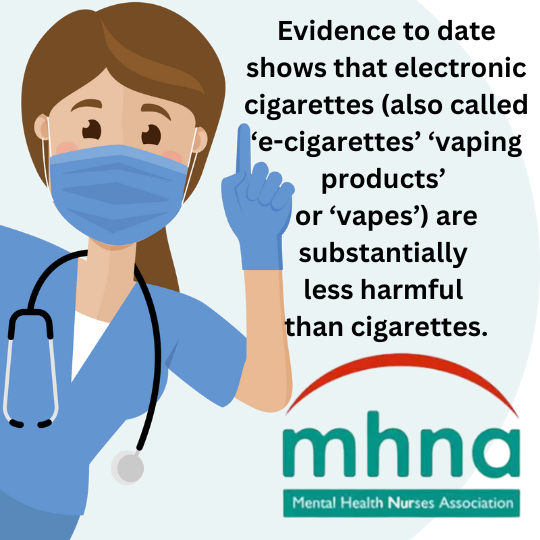
London Tobacco Alliance
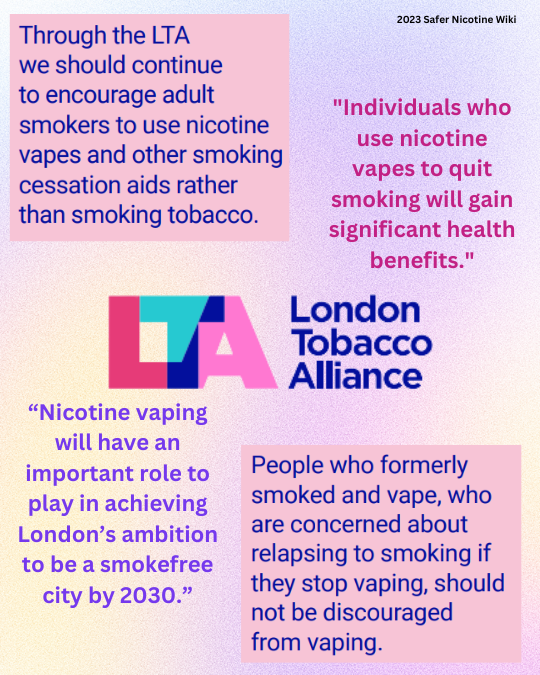
Mental Health Providers Forum
Stop Smoking London
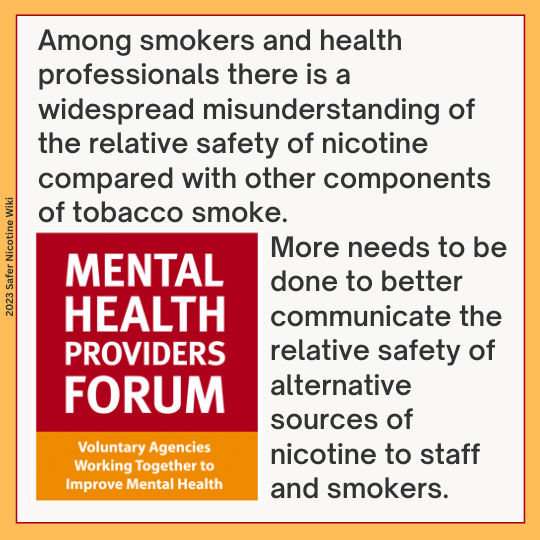
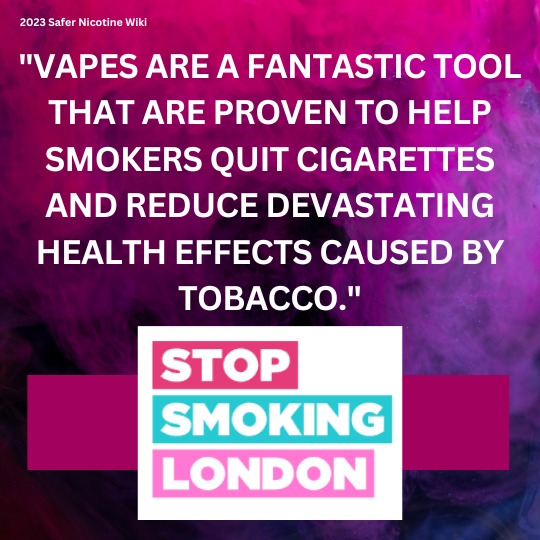
Public Health Action
North East North Cumbria ICB Smokefree
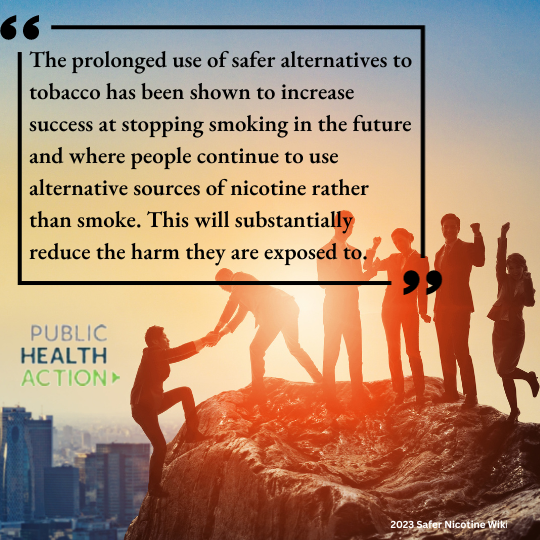
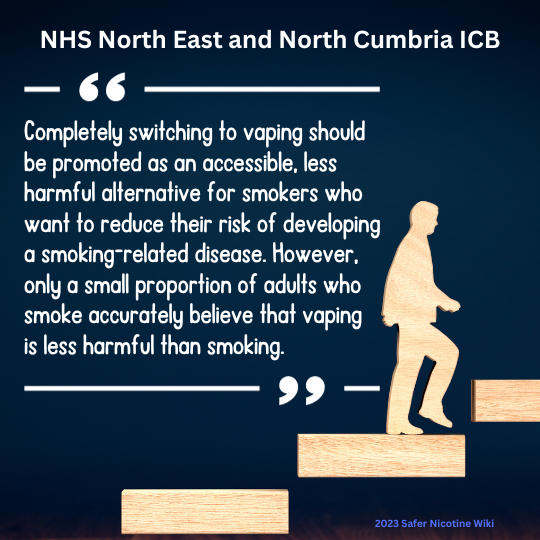
Smokefree Sheffield
Smokefree Yorkshire & Humber
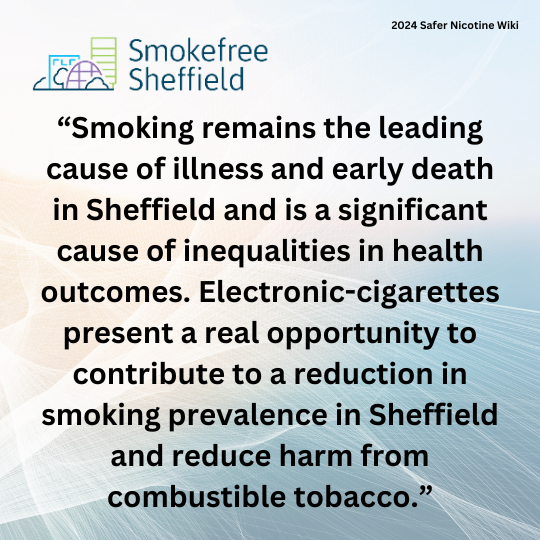
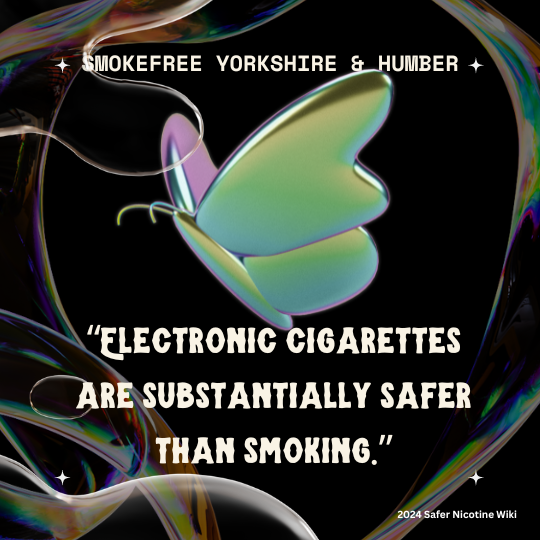
Hertfordshire County Council
Camden and Islington Public Health
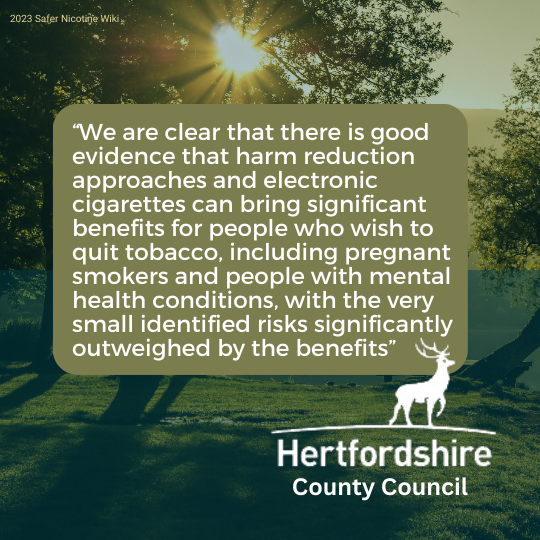
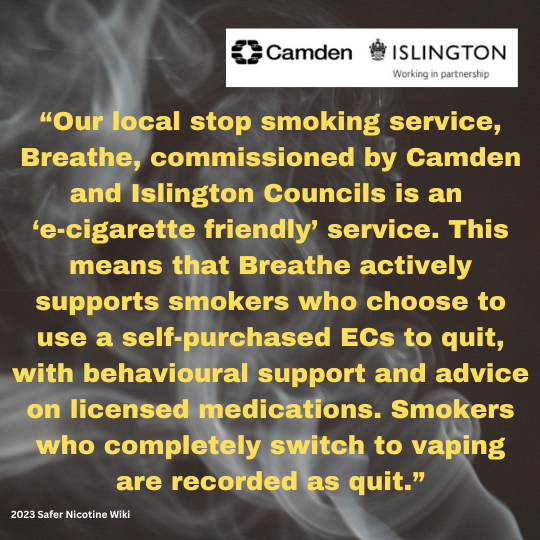
Sheffield Clinical Commissioning Group
Unite the Union in Health
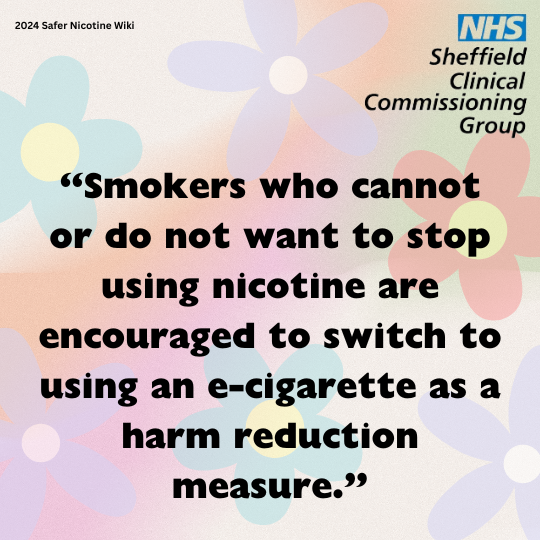
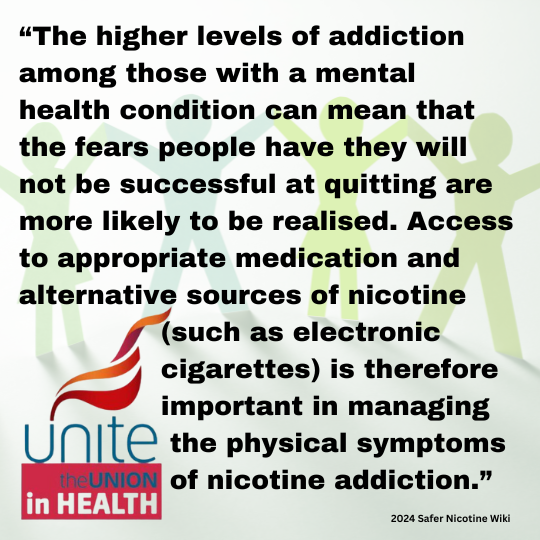
Public Health Nottinghamshire County
Sheffield City Council
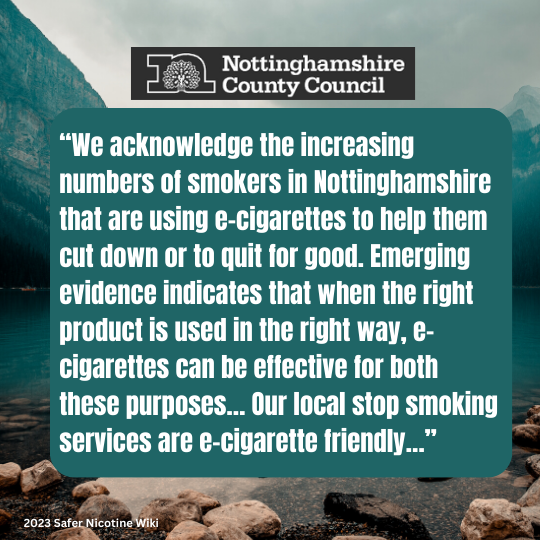
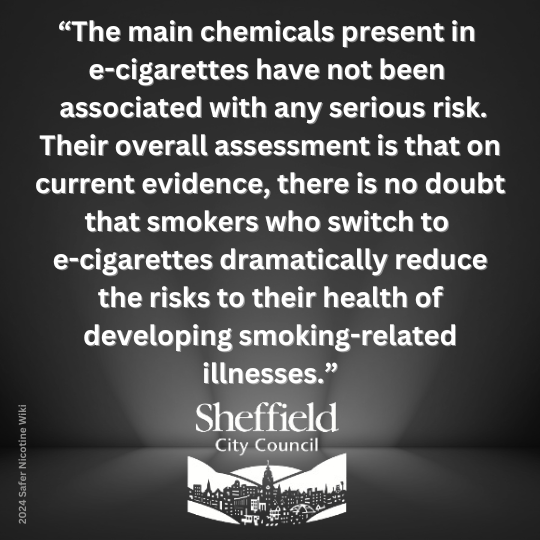
Tobacco Control Collaborating Centre
York Mental Health & Addictions Research Group
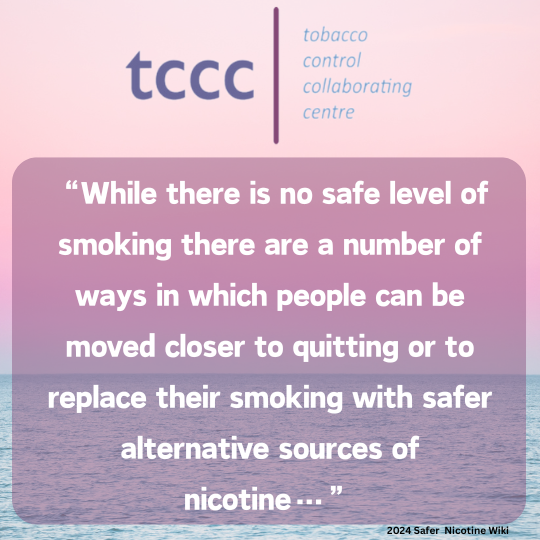
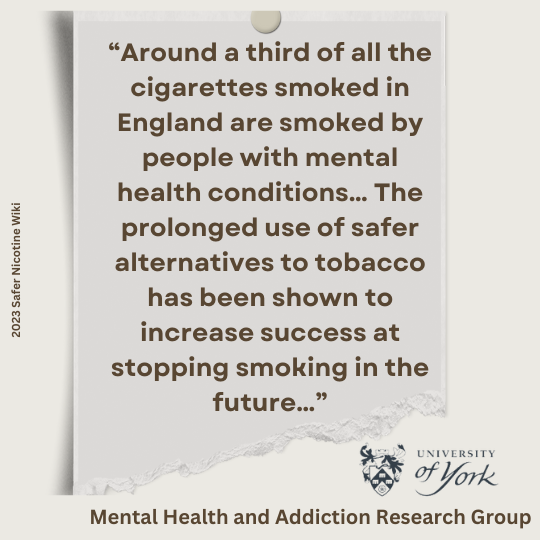
Sheffield Children’s
Oral Health Foundation
- Source (Formerly known as the British Dental Health Foundation)
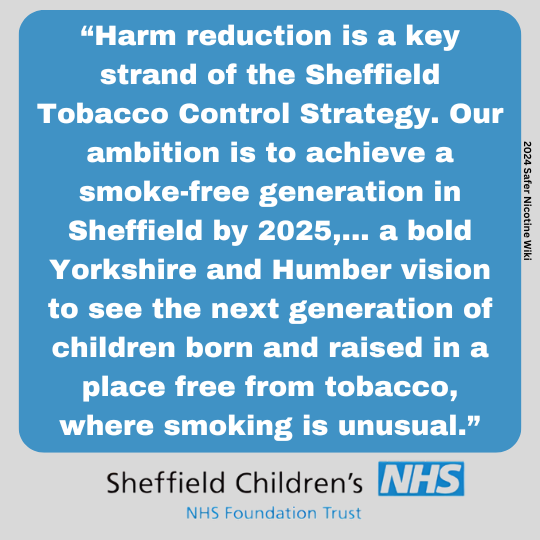
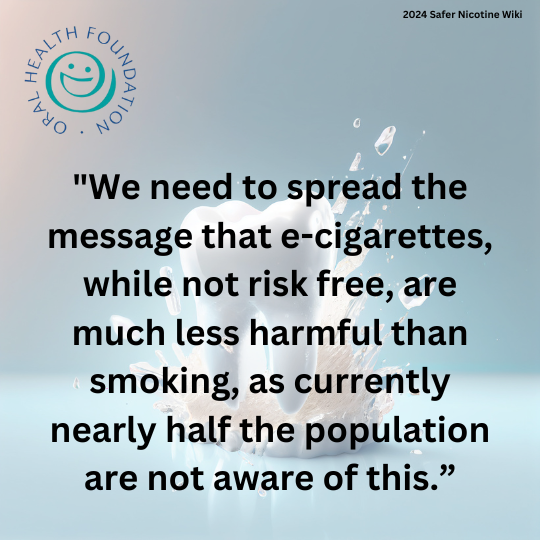
Drug Science UK
Men's Health Forum UK
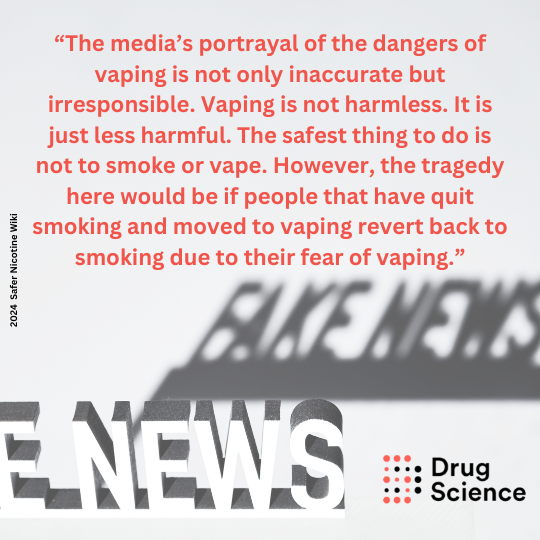
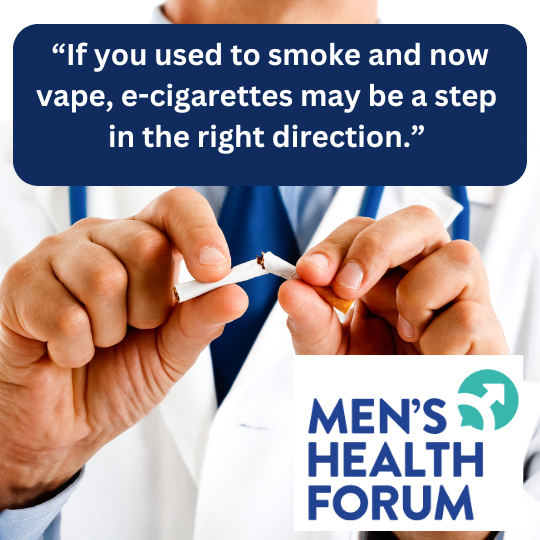
Community Pharmacy Sheffield
Sheffield Teaching Hospitals
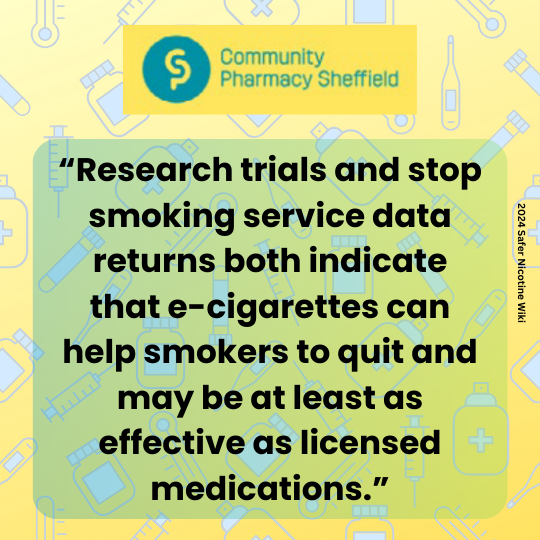
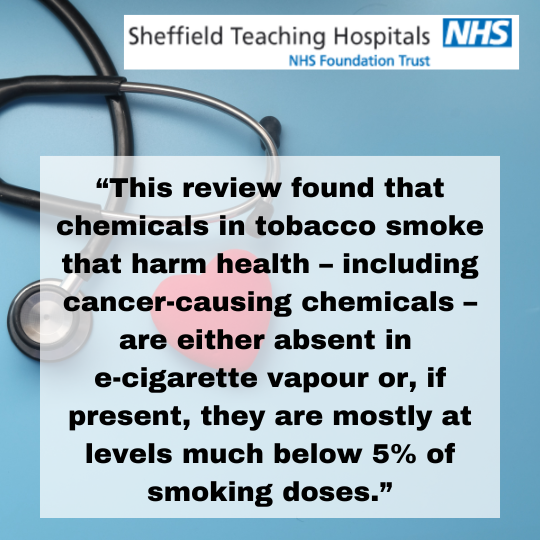
Zest Community Centre
Sheffield Health and Social Care
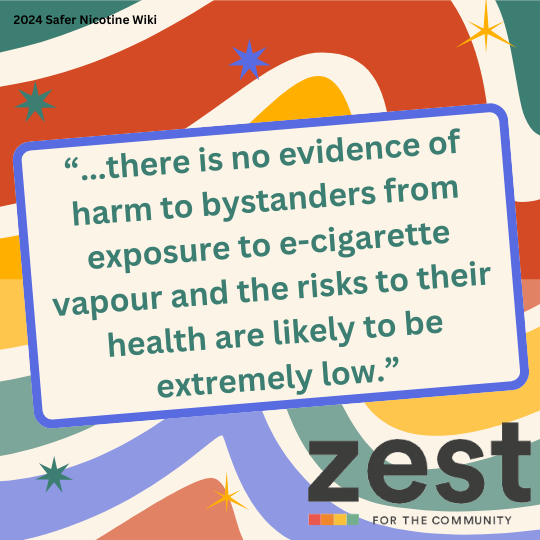
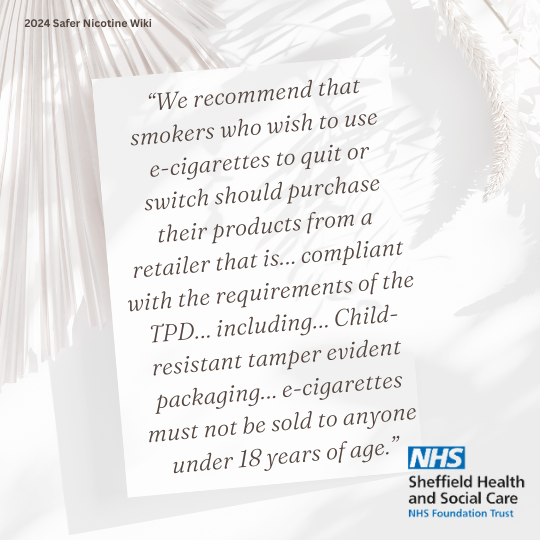
diva Sheffield
Scottish Government
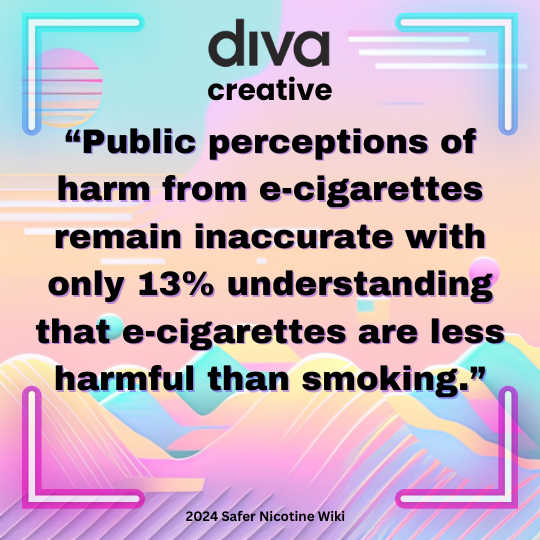
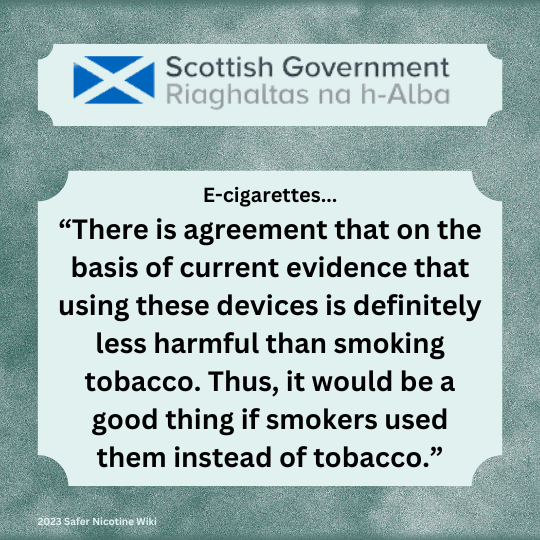
Scottish Directors of Public Health
Scottish Health Promotion Managers
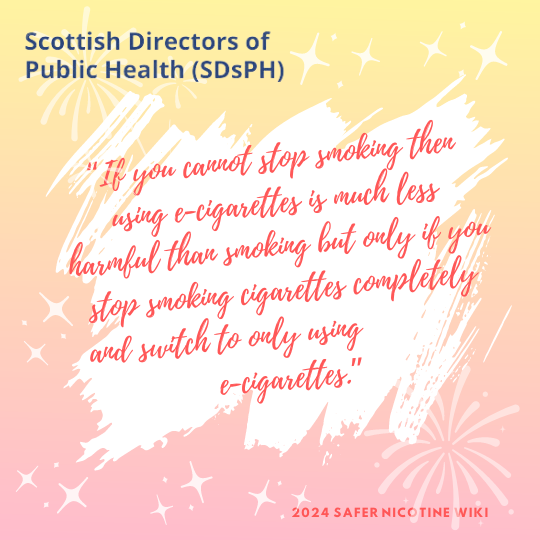
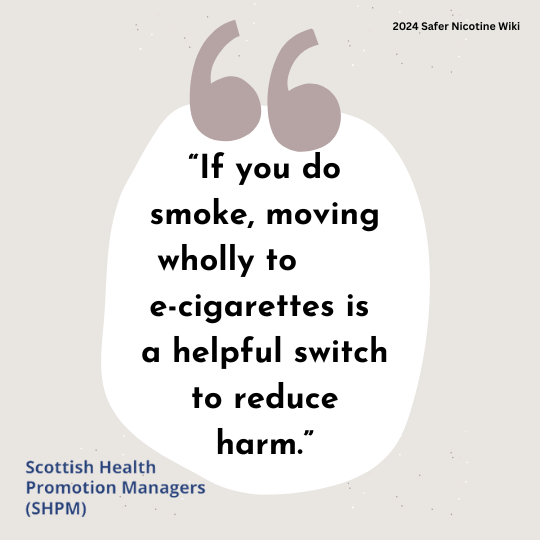
National Health Service Scotland
Action on Smoking and Health Scotland
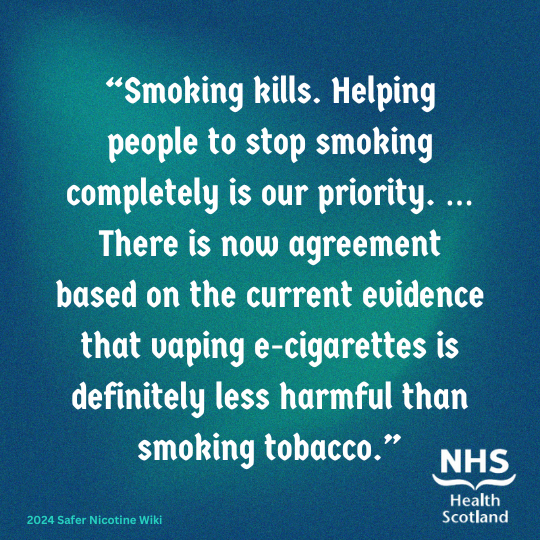
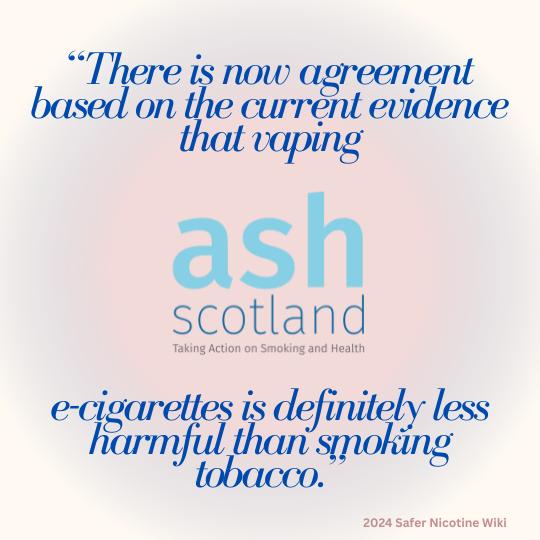
NHS Lothian
NHS Ayrshire and Arran - Scotland
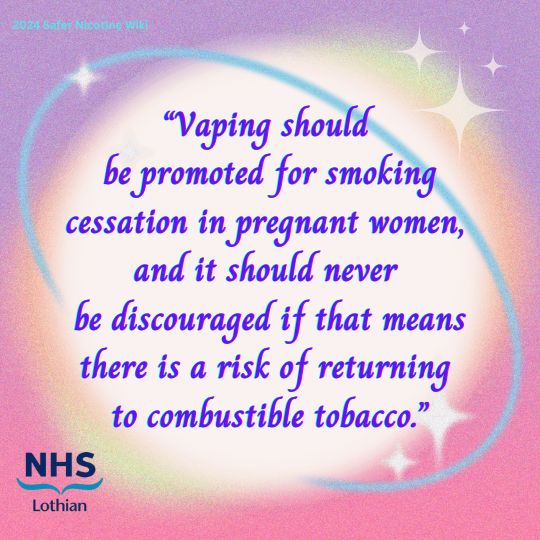
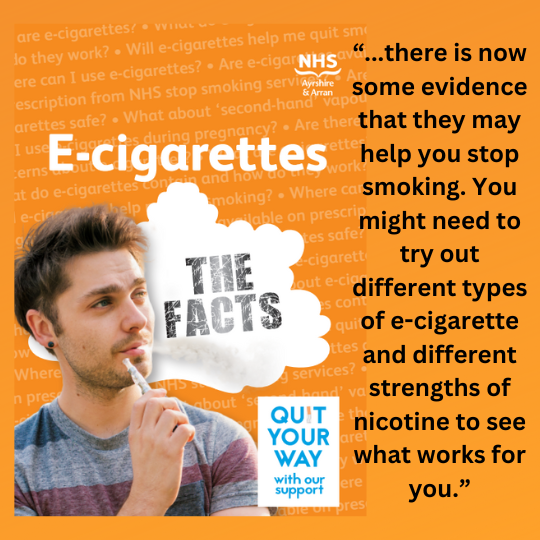
NHS Glasgow and Clyde - Scotland
Scottish Collaboration for Public Health Research and Policy
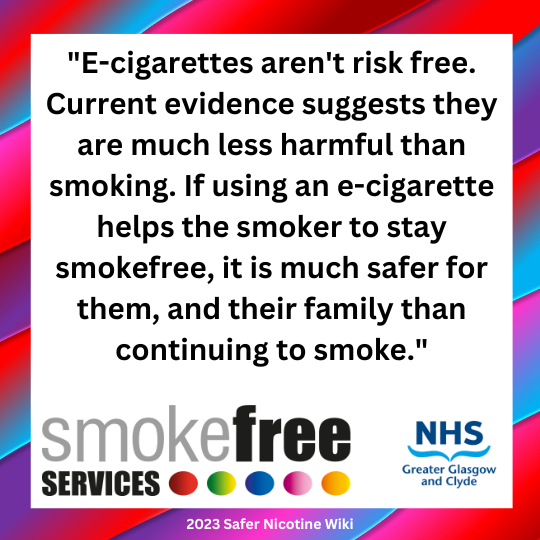
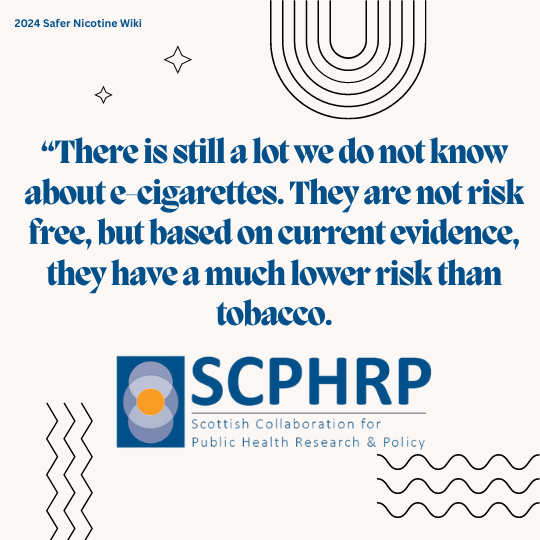
Chest Heart & Stroke Scotland
NHS Tayside
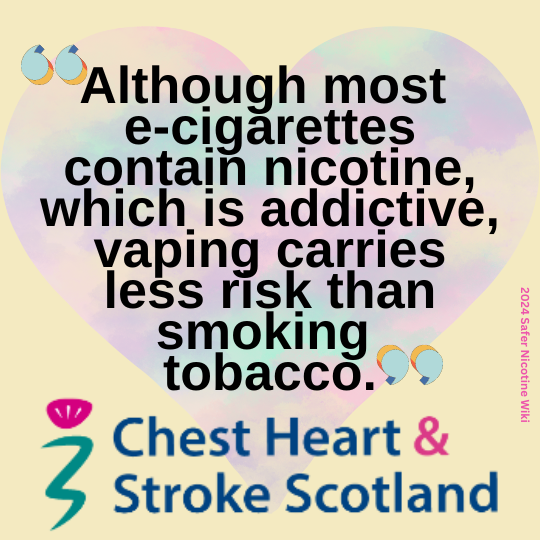
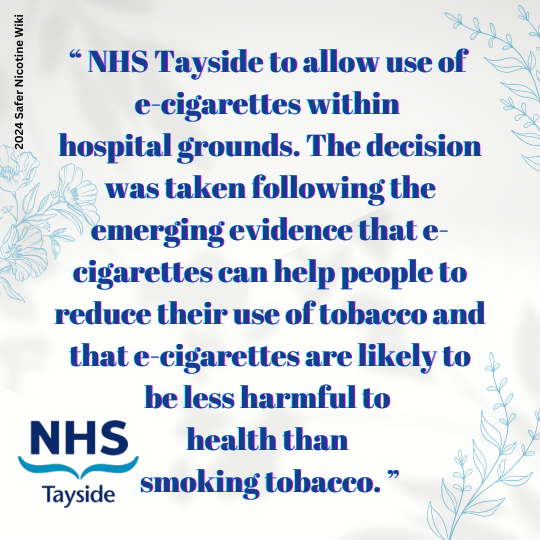
Royal College of Physicians and Surgeons of Glasgow
Royal College of Physicians of Edinburgh
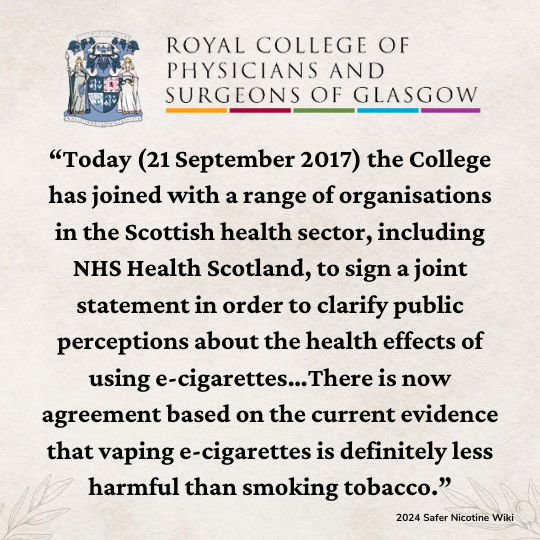
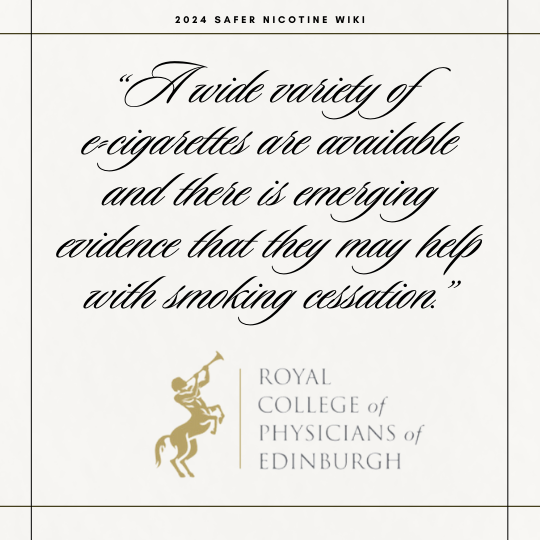
Royal Environmental Health Institute of Scotland
Scottish Consultants in Dental Health
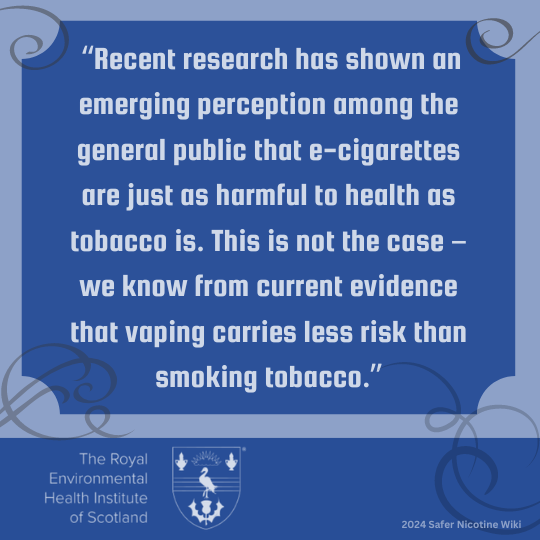
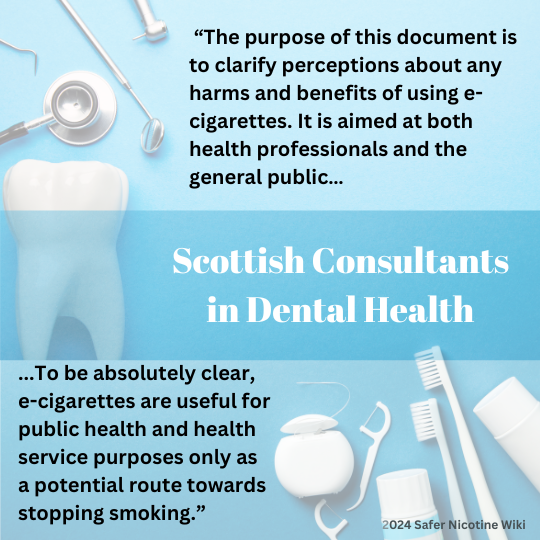
Scottish Thoracic Society
University of Edinburgh
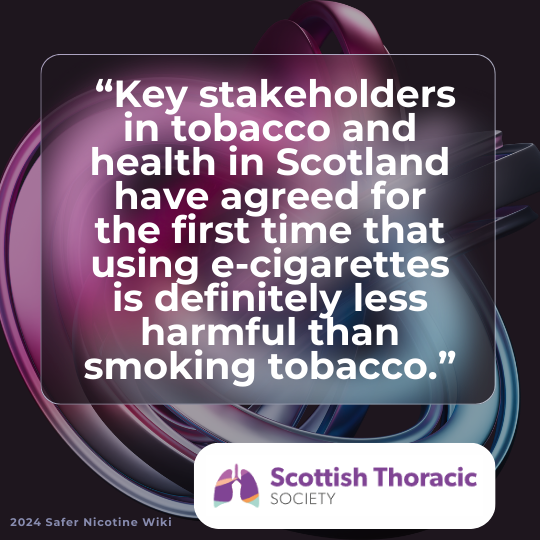
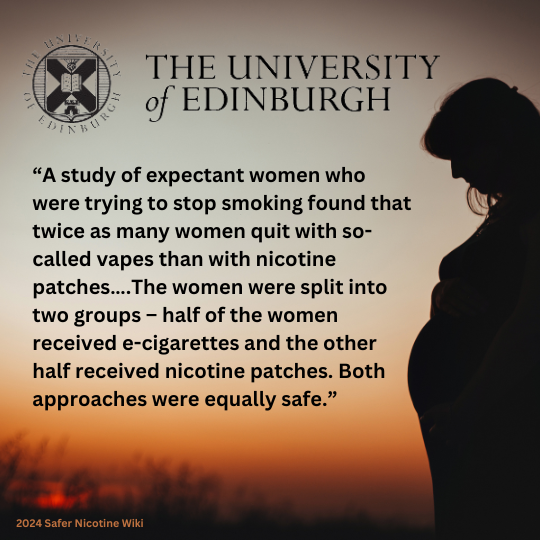
University of Stirling
Health Information and Quality Authority (Ireland)
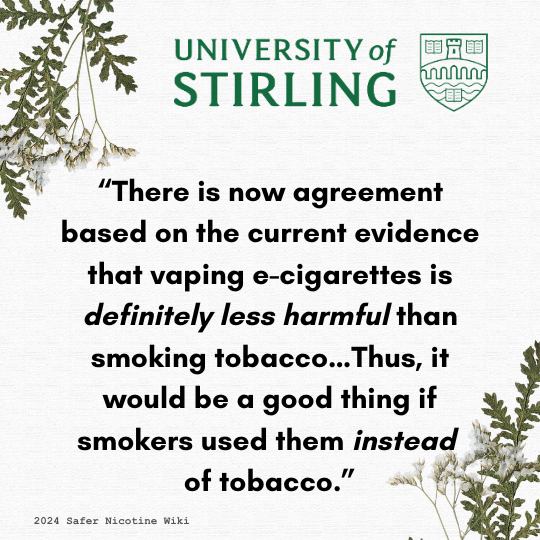
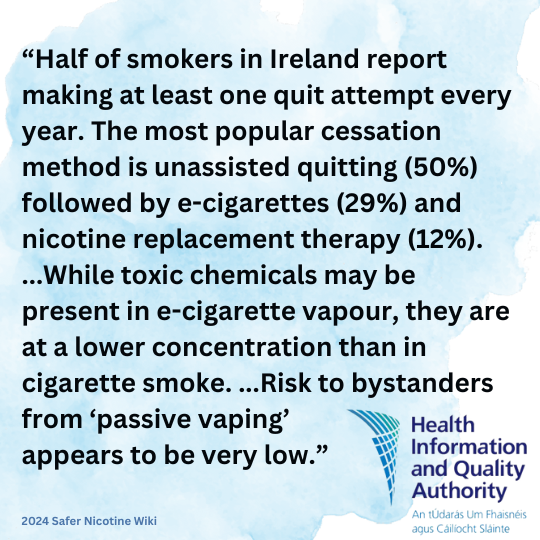
Irish Cancer Society
The Chartered Institute of Personnel and Development
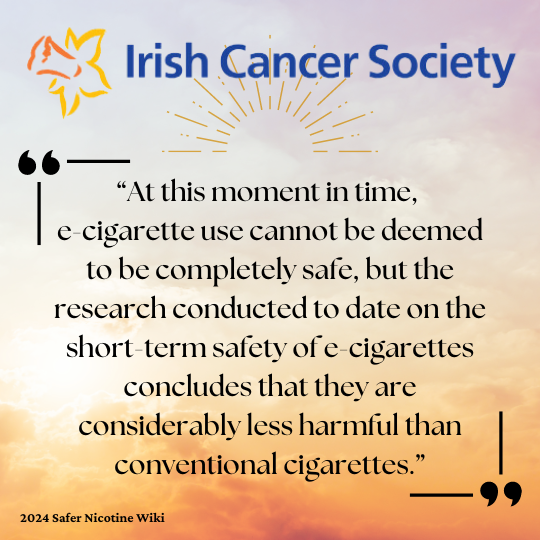
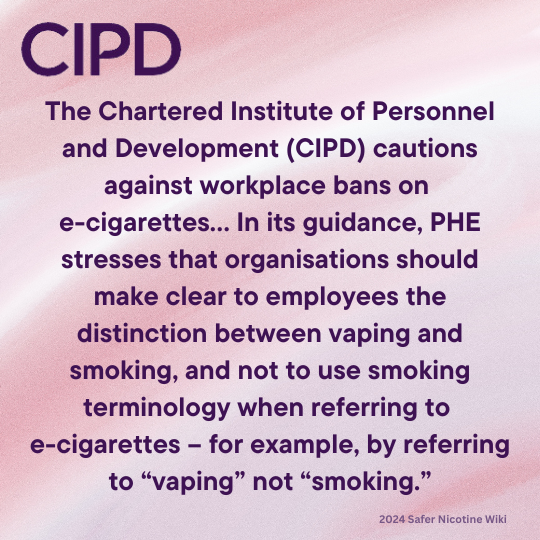
Irish Heart Foundation
Health and Safety Executive
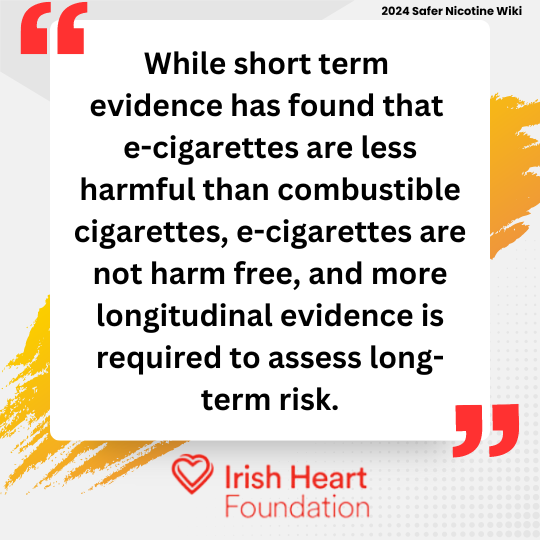
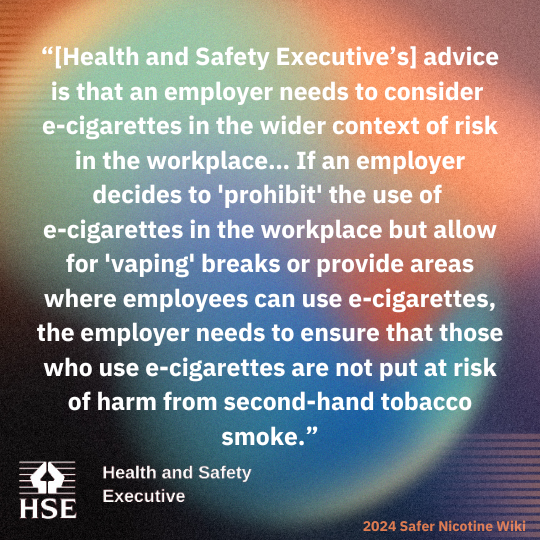
ASH Ireland
Health Service Executive
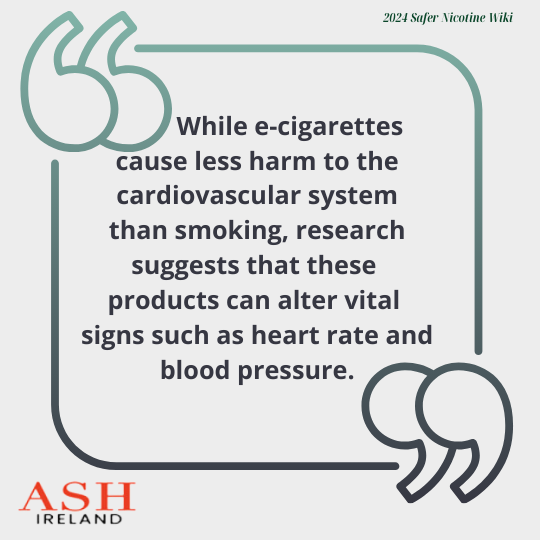
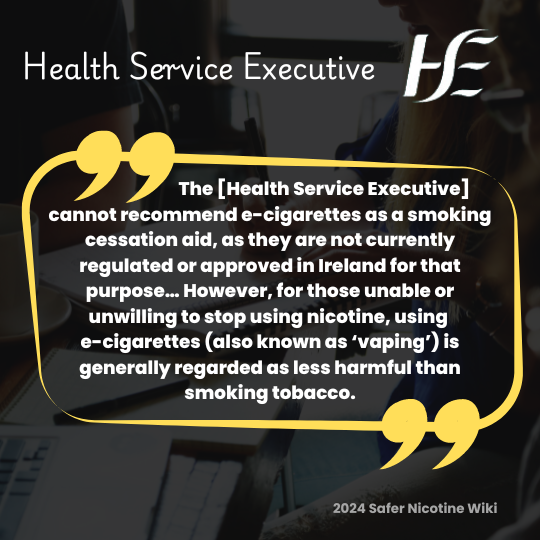
Men’s Development Network
Dental Health Foundation - Ireland
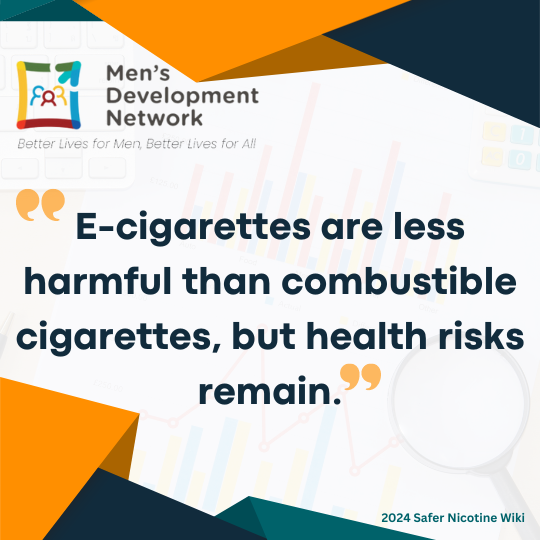
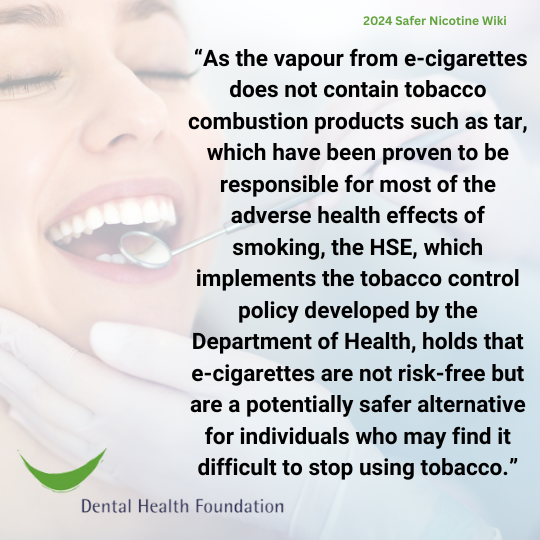
Mental Health Ireland
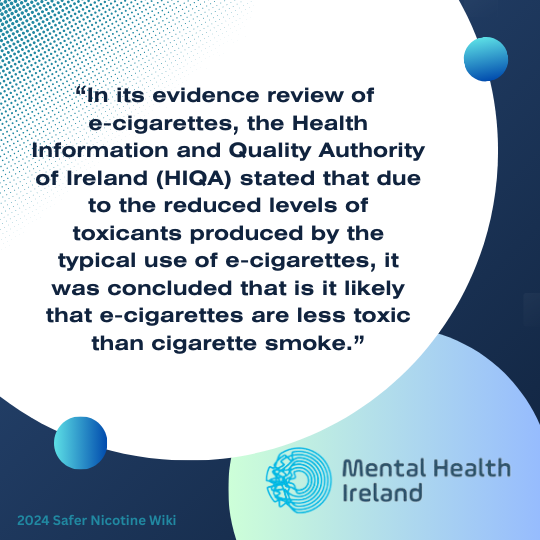
[
Irish Pharmacy Union
Men's Health Forum - Ireland
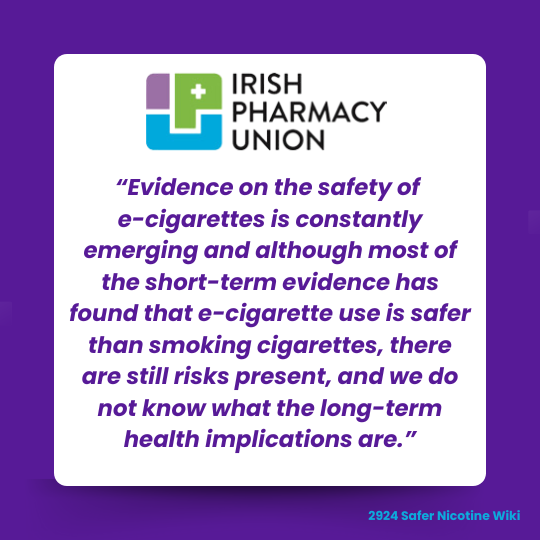
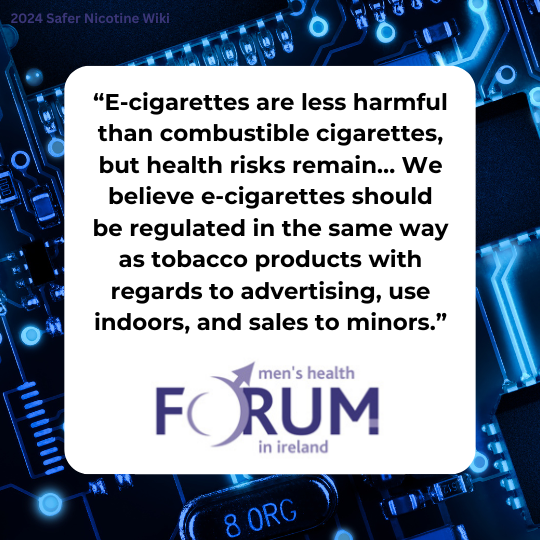
Public Health Wales
Action on Smoking and Health (ASH) Wales Cymru
- Source
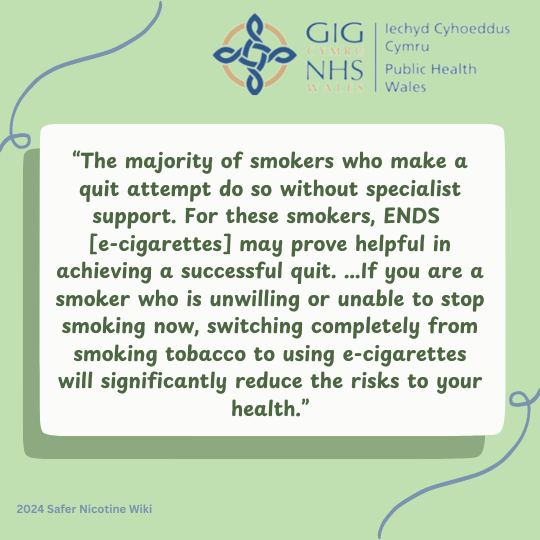
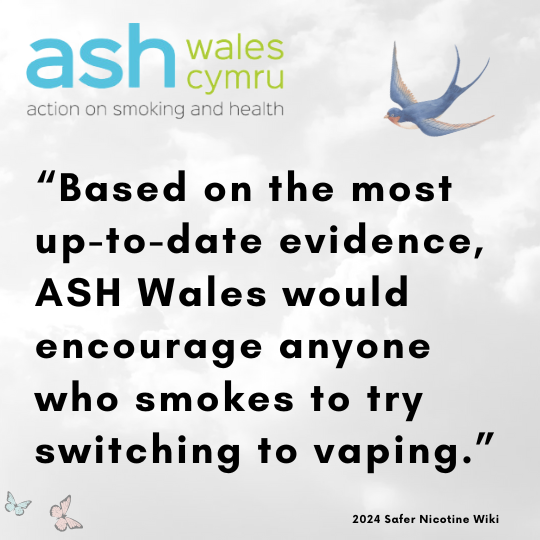
Yorkshire Cancer Research
- Source
South East Tobacco Control Network
- Source
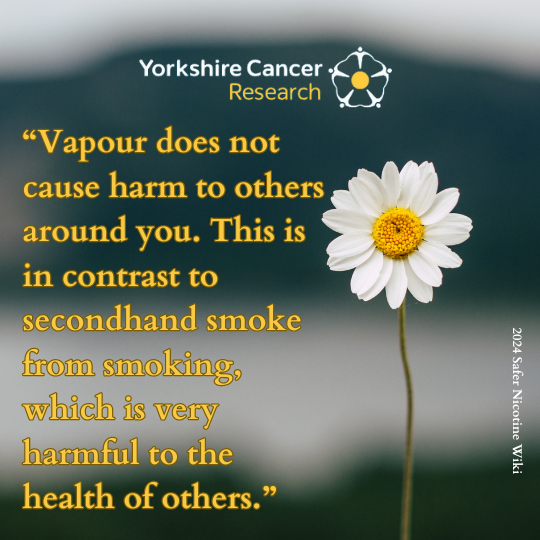
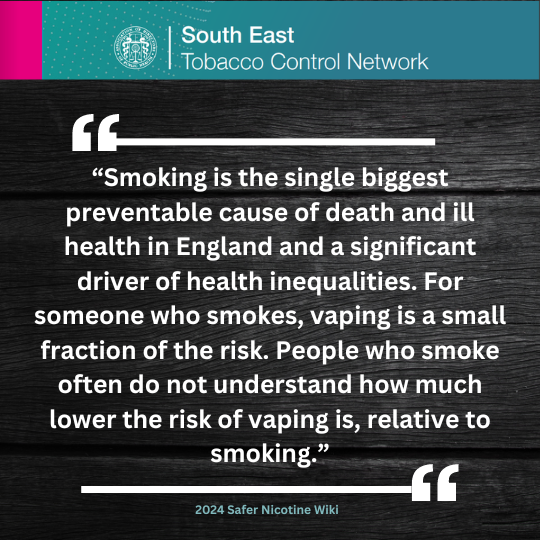
Healthy Surrey
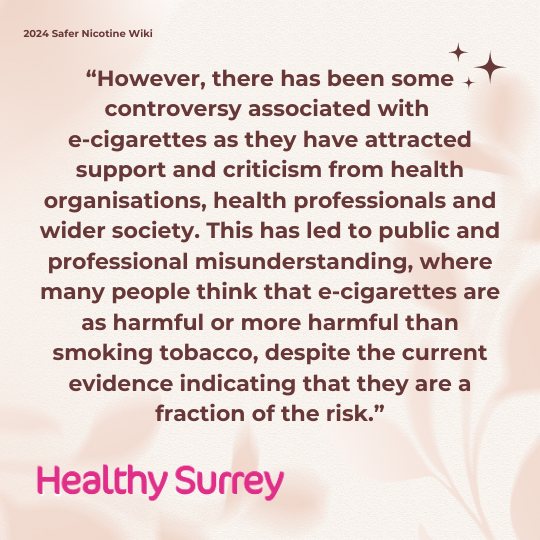
Australia (See Also: "Australia and New Zealand")
Therapeutic Goods Administration (Australia)]
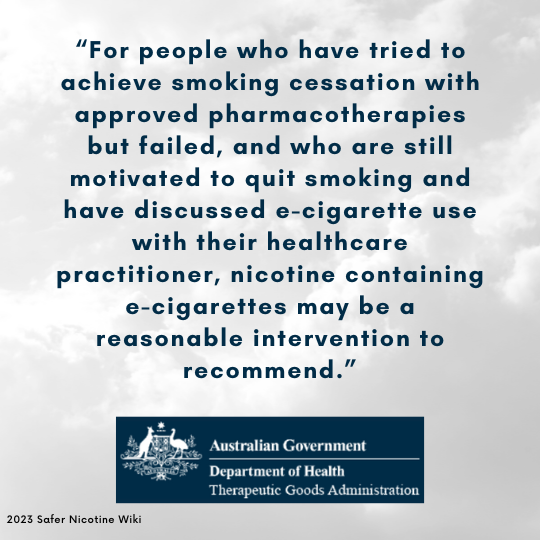
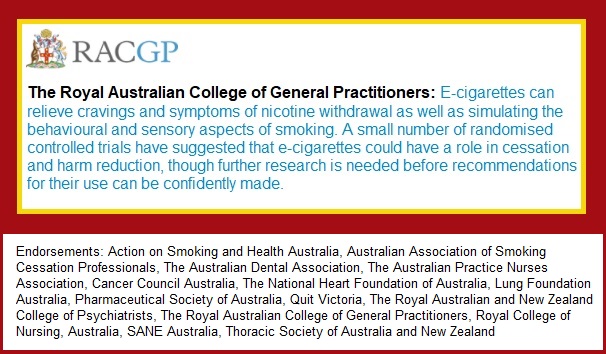
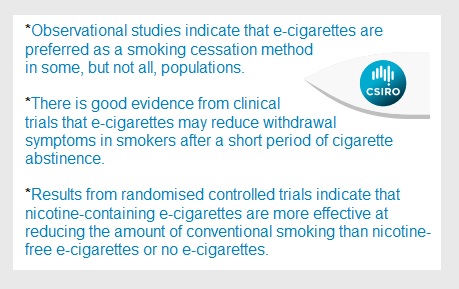
- Source
- E-cigarettes may be beneficial for individuals who smoke and use them to quit smoking completely.
- E-cigarette aerosols contain considerably lower amounts of harmful and toxic chemicals compared to conventional cigarette aerosols. An extensive study from 2021 tested carbonyl compounds (including aldehydes such as acetaldehyde and formaldehyde, Section 12.4.3.2) and polycyclic aromatic hydrocarbons (PAHs, Section 12.4.3.6) levels in e-cigarette compared to conventional cigarette and heated tobacco products aerosols. Among the 19 carbonyl compounds tested, 17 were lowest in e-cigarette aerosols. Among the 22 PAHs that were detected, 21 were lowest in e-cigarette aerosols compared to conventional cigarette and heated tobacco products. When comparing average levels of all the compounds in each class, e-cigarettes had a 99% reduction per puff of carbonyl compounds compared to conventional cigarettes, and a 98% reduction per puff of PAHs, many of which are known causes of cancer.
Australia and New Zealand
Royal Australian & New Zealand College of Psychiatrists (RANZCP)
- Source
- NOTE: New Statement 2023 (current graphic from old statement) E-cigarettes and vaporisers
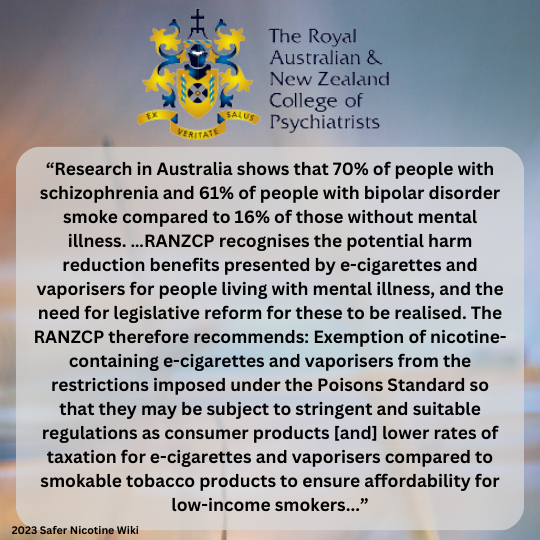
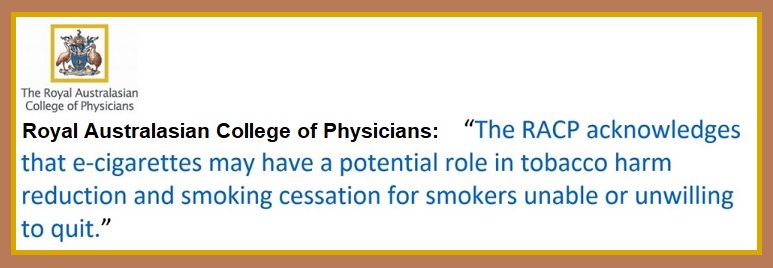
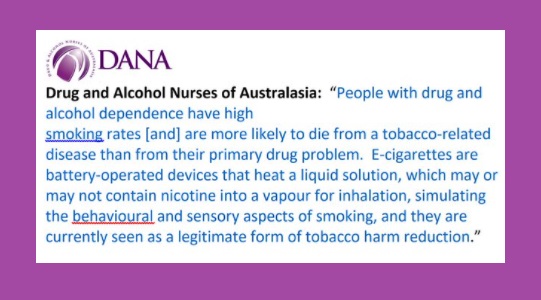
Belgium
Belgian Superior Health Council
“Yes, the e-cigarette has its risks, but is clearly less harmful than a traditional tobacco cigarette. According to the Council, the e-cigarette can therefore be a tool to give up tobacco completely.” [Google Translate]
Canada
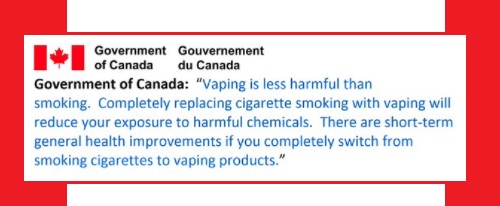
Health Canada
“If you are an adult that currently smokes, switching completely to vaping is a less harmful option than continuing to smoke. …Vaping is not known to cause Popcorn lung.” (January 2023) “While vaping products are not harmless, vaping exposes people who smoke to lower levels of harmful chemicals than continuing to smoke.” Statement from Minister of Health (January 16 2023).
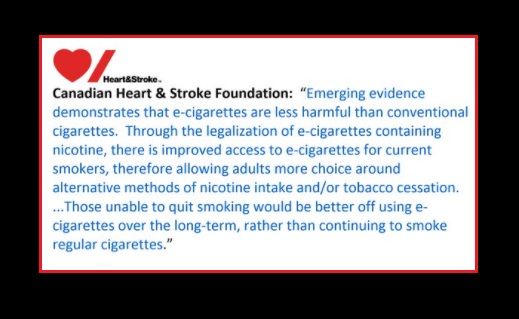
Centre for Addiction and Mental Health +3 organizations - Canadian Lower-Risk Nicotine Use Guidelines (LRNUG)
“Funded by Health Canada’s Substance Use and Addictions Program, the LRNUG has developed several resources to help guide people who use, or are thinking about using nicotine, on how to lower the risk associated with these products. ...E-cigarettes with nicotine may be an effective cessation aid for people who use combustible tobacco. People who switch from combustible tobacco to e-cigarettes will reduce their exposure to numerous toxicants and carcinogens.” Quick Tips: “Using tobacco in forms that don’t burn, like smokeless tobacco or heat-not-burn products, will reduce your exposure to harmful combusted chemicals including carbon monoxide. [You can] further reduce your risk by switching to products that don’t have tobacco like NRT [e.g., nicotine patches or nicotine gum] or e-cigarettes.” Statement by: CAMH - Centre for Addiction and Mental Health, Pharmacists for a Smoke-free Canada, The Ontario Tobacco Research Unit, Centre for Effective Practice
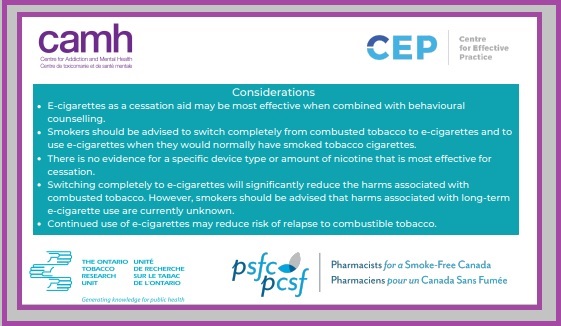


England (See Region: England, Ireland, Scotland, and Wales)
France
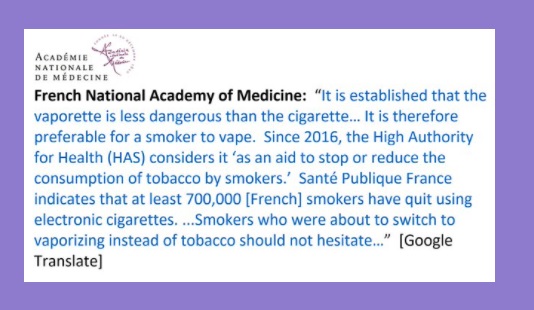
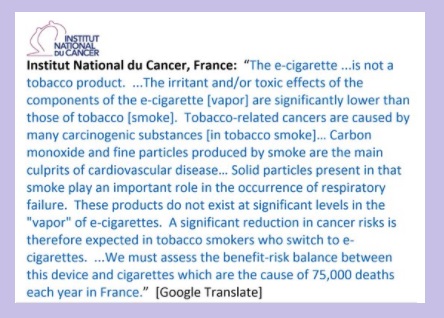
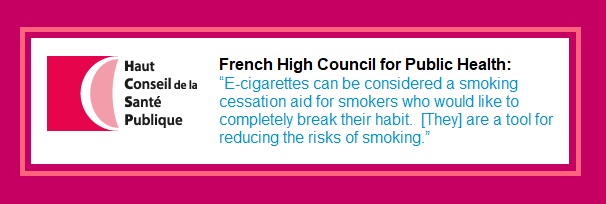

Collège de la médecine générale (College of General Medicine)
“Concerning the electronic cigarette, we consider it as a risk reduction tool and believe that we should not discourage the smoking patient who is learning to vape with a view to weaning [reducing smoking] by indicating to him that it is necessary to avoid the use concomitant cigarette/e-cigarette.”
Germany

German Society of Addiction (Deutsche Suchtgesellschaft – Dachverband der Suchtfachgesellschaften)
“In general, one can assume that the vapor from an e-cigarette is much less harmful than conventional cigarette smoke and that the e-cigarette can be used for nicotine withdrawal if guideline-based psychotherapeutic and/or drug treatments for nicotine withdrawal are ineffective or unwanted.”
Ireland (See Region: England, Ireland, Scotland, and Wales)
Isle of Man
Public Health Isle of Man
“E-cigarettes can be a particularly helpful way to stop smoking tobacco especially when combined with a specialist face to face support. Although experts say they are not entirely risk free, they are at least 95% less harmful than tobacco.”
Luxembourg
Fondation Cancer
“The electronic cigarette … does not contain tobacco. The vapor produced does not contain carbon monoxide or carcinogenic substances in significant quantities. Despite a lack of long-term scientific studies, it probably presents a reduced risk compared to tobacco (if not combined with cigarettes). …In general, we recommend that you vape with the most concentrated liquid possible, in order to reduce your consumption of liquid and therefore your exposure to inhaled substances.” [emphasis in original] [Google Translate]
Malaysia
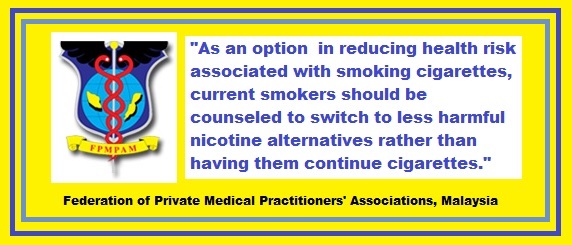
New Zealand (See Also: "Australia and New Zealand")
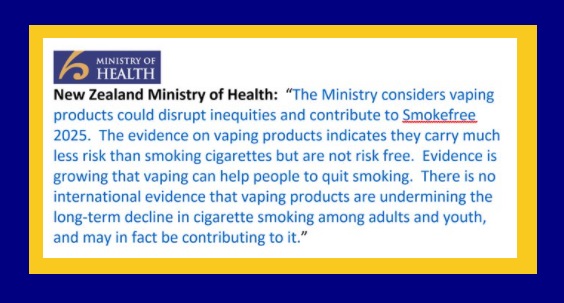
Official New Zealand Ministry of Health Position Statement
“Vaping is not harmless but it is much less harmful than smoking. Vaping has the potential to help people quit smoking and contribute to New Zealand’s Smokefree 2025 goal.” Organizations that support this statement include: Health Promotion Agency/Te Hiringa Hauora (HPA), Hāpai te Hauora/Māori Public Health, New Zealand Medical Association (NZMA), Action for Smokefree 2025 (ASH), National Training Service (NTS), All District Health Boards, Pharmacy Guild of New Zealand, New Zealand Heart Foundation, New Zealand College of Midwives, Parents Care Centre
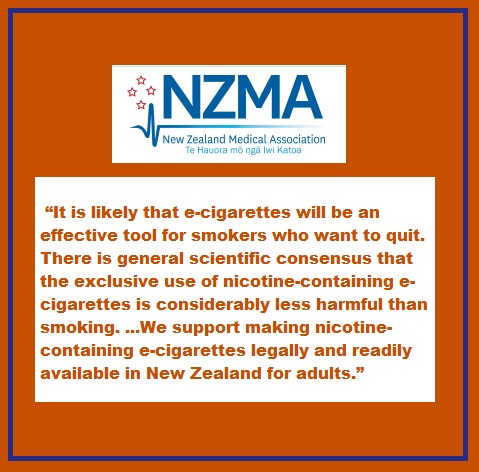
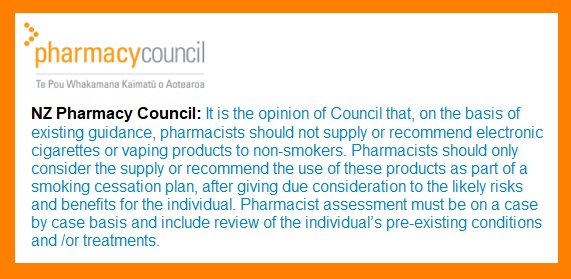
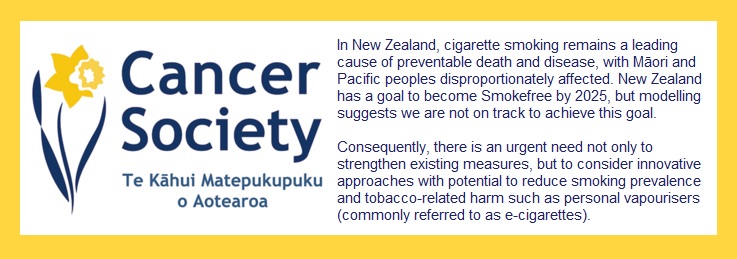
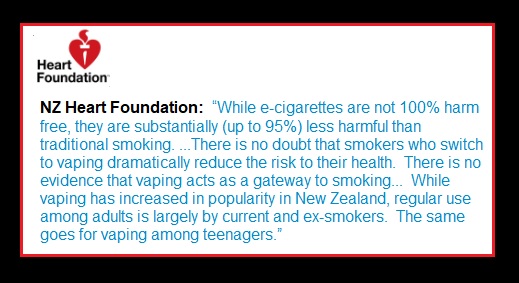
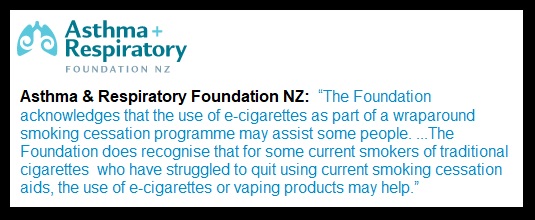
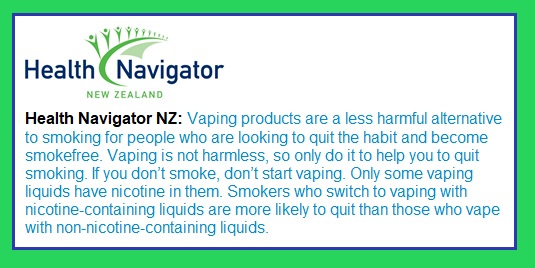
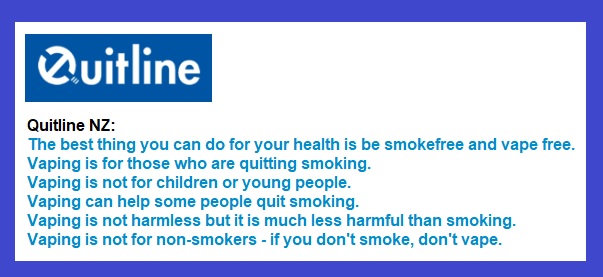
Philippines
2018
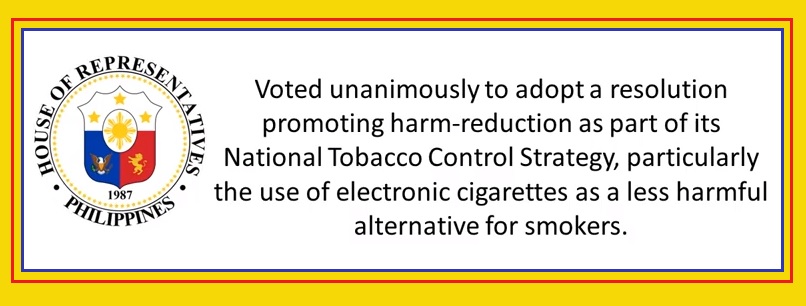
Poland
Scotland (See Region: England, Ireland, Scotland, and Wales)
United Kingdom (See Region: England, Ireland, Scotland, and Wales)
United States
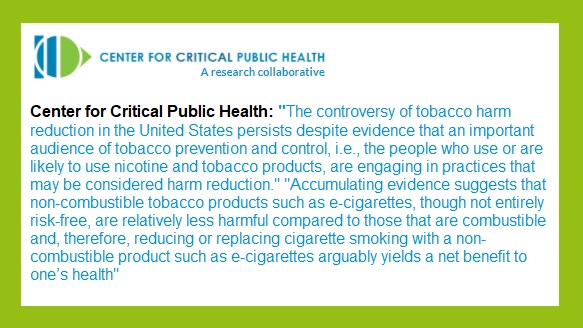
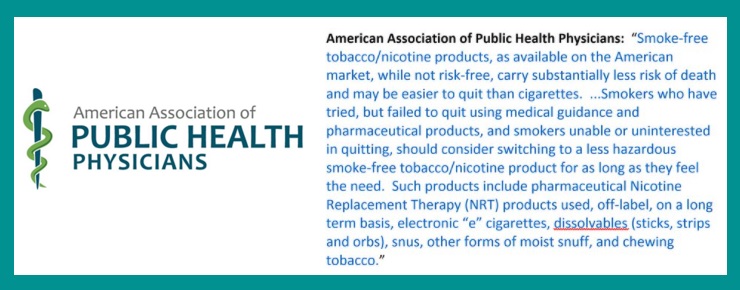

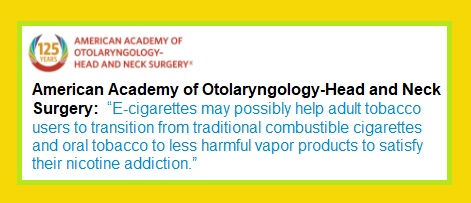
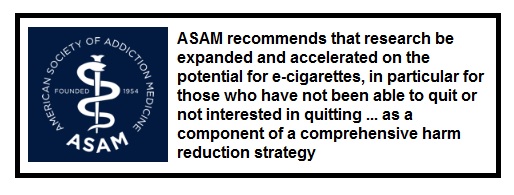

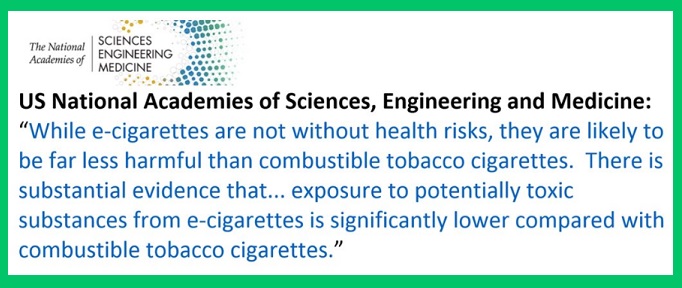
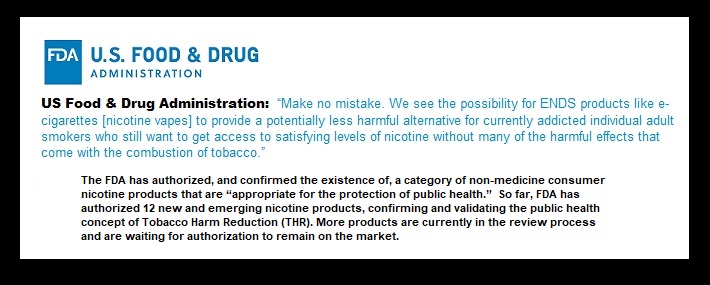
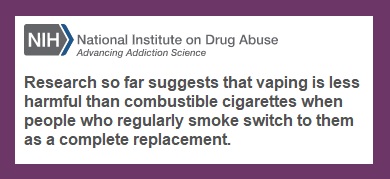


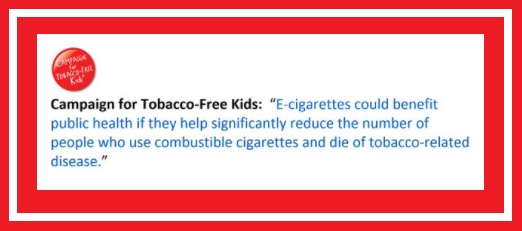
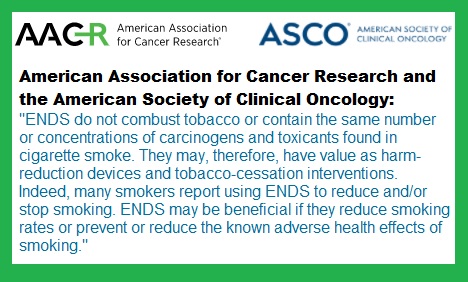
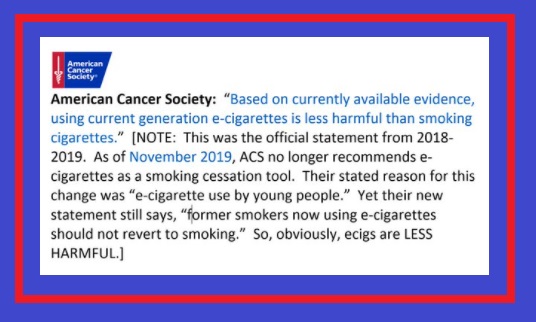
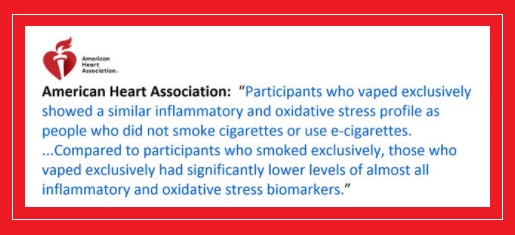
2022
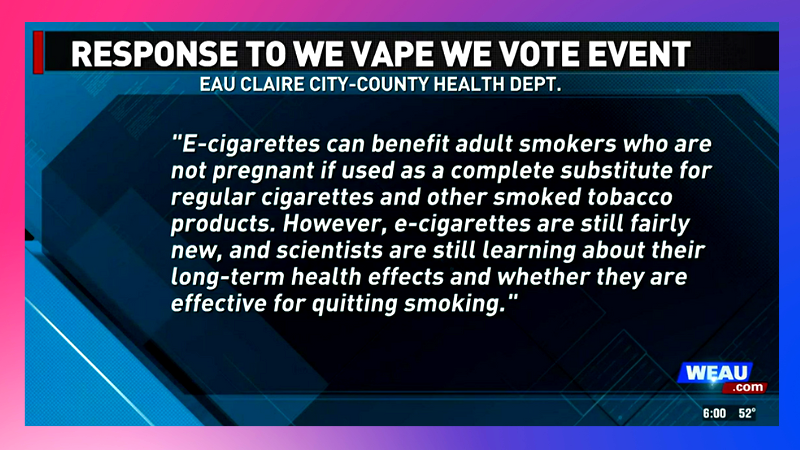
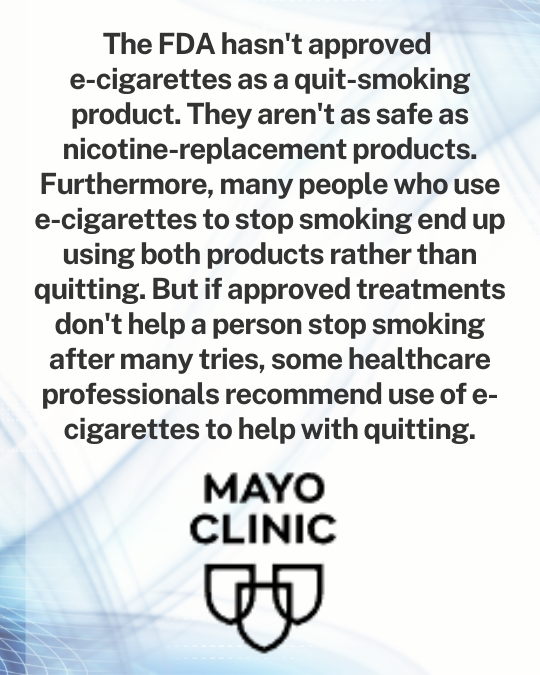
Uruguay
2021

Wales (See Multinational pt. 2/United Kingdom)
Important! Instructions to page editors:
1 meme for each org, with a link saved on wayback machine of the source so anyone can verify it was said.
Updated information e.g. better quotes to use may be left in the suggestions section below:
Suggestions to add to this page
- "Vaping can help some people quit smoking."
- Many European authorities, such as the German Federal Risk Assessment Institute and the
Federal Centre for Health Education in Germany, the National Institute for Public Health and the Environment (Netherlands), and the UK Committees of Toxicity, Mutagenicity, and Carcinogenicity of Chemicals in Food, Consumer Products, and the Environment, focused on the importance of e-cigarettes and heated tobacco as a safe alternative compared to burning cigarettes.
2023: Page 3 of this email from FDA screenshot included below, as well as PDF of the full mail (preserving blue links to the FDA website)
